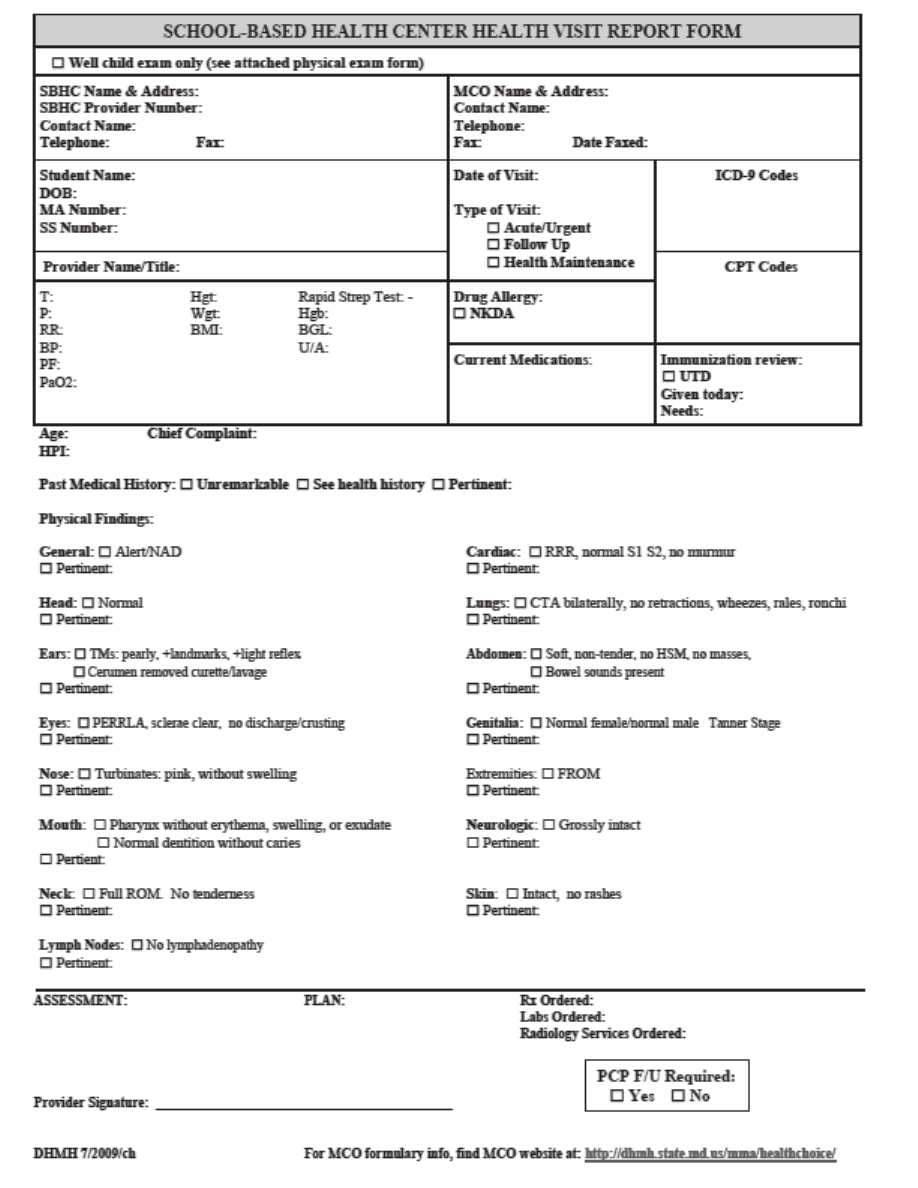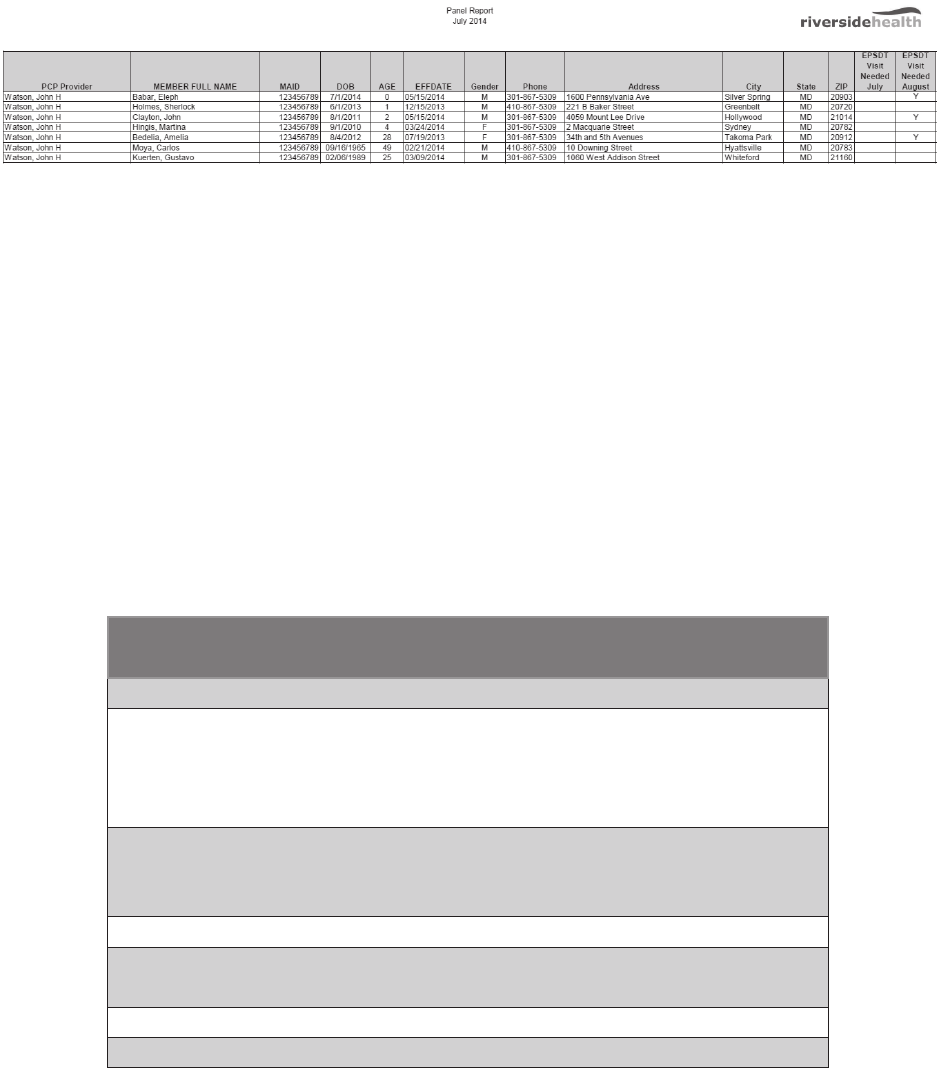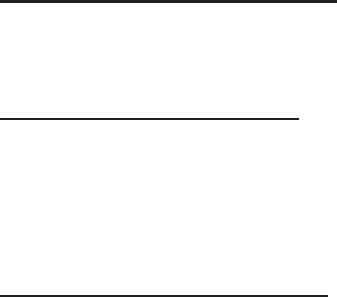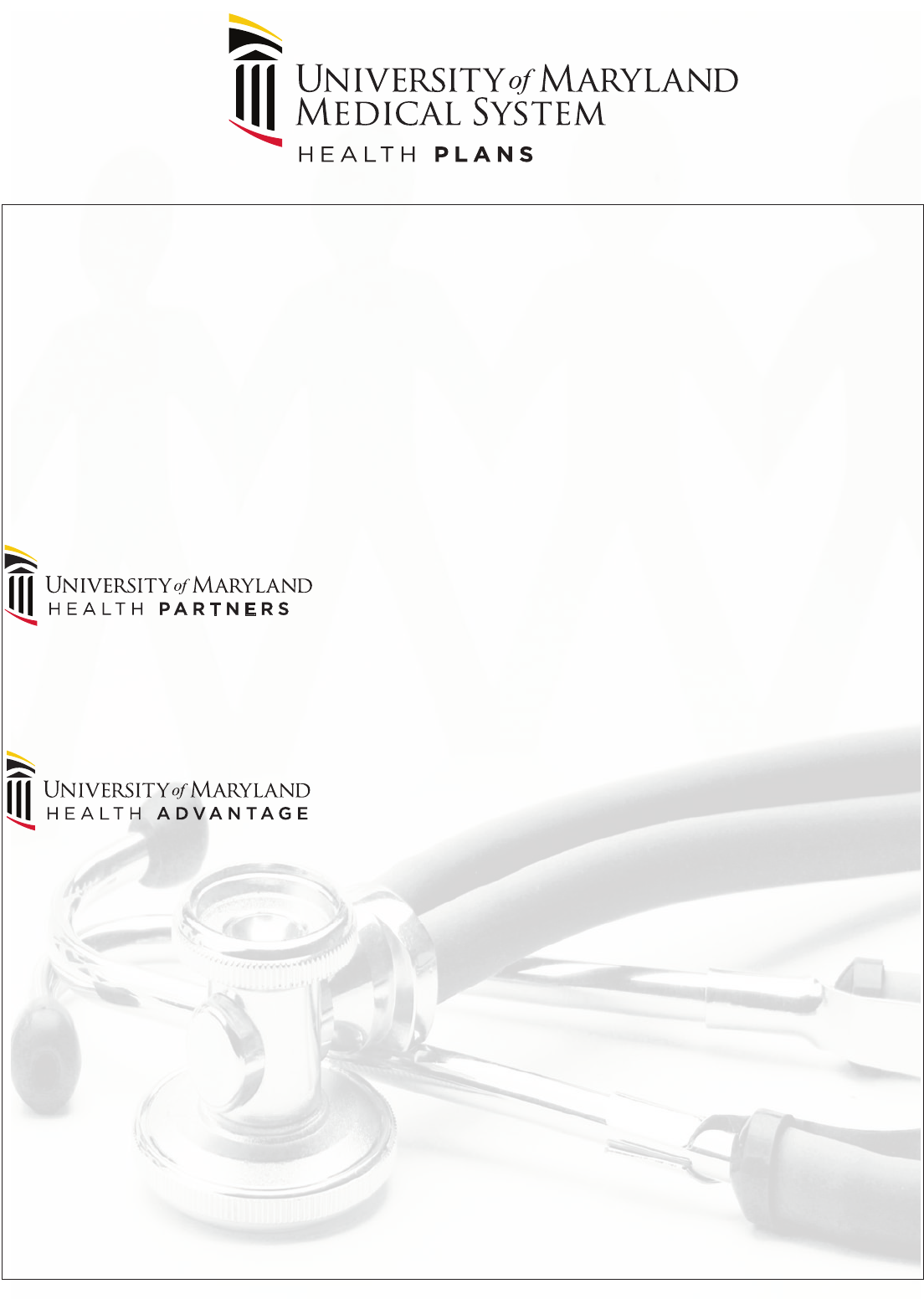
1966 Greenspring Drive, Suite 100, Timonium, MD 21093
410-779-9359 | 800-730-8543 | TTY: 711 | pro[email protected]om
www.umhealthpartners.com
July 2017
Provider Manual


Introduction to the Provider Manual
HealthChoice is Maryland’s Medicaid managed care program. Overseen by
the Maryland Department of Health (MDH), the HealthChoice program serves
most Medicaid participants. These individuals are enrolled in one of the
participating managed care organizations (MCOs). Each MCO has policies and
procedures that providers who deliver services to members must adhere to. While
each MCO has its own policies and procedures, many program elements apply to
all providers, regardless of the MCO. The purpose of this manual is to explain those
program elements and be a useful reference for providers who participate in the
HealthChoice program.
The manual is divided into six sections:
Section I - General Information. This section provides general descriptive information
on the HealthChoice program including, but not limited to, program eligibility, MCO
reimbursement policies, continuity of care and transportation.
Section II - Provider Responsibilities. This section discusses expectations of all
providers, regardless of MCO affiliation.
Section III - HealthChoice Benefits and Services. This section provides a listing of the
benefits that are and are not the responsibility of all MCOs that participate in
HealthChoice. This section briefly outlines some of the optional benefits that
University of Maryland Health Partners may provide. This section also identifies
benefit limitations and services that are not the responsibility of University of
Maryland Health Partners.
Section IV - Rare and Expensive Case Management (REM). Members with certain
diagnoses may disenroll from University of Maryland Health Partners and receive
their services through the REM program. This section details the REM program.
Section V - MDH Quality Improvement Program and MCO Oversight Activities.
MDH conducts numerous quality improvement activities for the HealthChoice
program. This section reviews DHMH’s quality improvement activities.
These activities are separate from quality improvement activities that
University of Maryland Health Partners may engage in.
Section VI - Corrective Managed Care. This section discusses the steps that should
be taken if a member is determined to have abused MCO pharmacy benefits.
1

2
HealthChoice Provider Manual
Table of Contents
I. General Information
Maryland HealthChoice Program
The Maryland HealthChoice Program
6
HealthChoice Eligibility
6
Provider Reimbursement
7
University of Maryland Health Partners Medical Record
Documentation
7
Records Storage and Release of Medical Records
10
Self-Referral & Emergency Services
10
Self-Referred Services For Children With Special
Healthcare Needs
10
PCP Contract Terminations
11
Continuity Of Care
11
Specialty Referrals
12
Transportation
12
Members Rights and Responsibilities
13
School Based Health Center Visit Report Form
15
II. Provider Responsibilities
Reporting Communicable Disease
17
Appointment Scheduling And Outreach Requirements
18
Services For Children
19
Special Needs Populations
21
Services Every Special Needs Population Receives
21
Special Populations-Outreach and Referral to LHD
22
Services for Pregnant and Post-Partum Women
22
Maryland Prenatal Risk Assessment Form
25
Children with Special Health Care Needs
28
Individuals with HIV/AIDS
29
Individuals with Physical or Developmental Disabilities
30

3
Individuals Who are Homeless
30
Adult Members with Impaired Cognitive Ability /
Psychosocial Problems
31
MCO Support Services (Outreach)
31
Referral Authorization Process
31
Authorization Grid
34
Affirmative Statement About Incentives
38
Utilization Management Criteria
38
Clinical Practice Guidelines
40
Claims Submission Guidelines
40
Subrogation
41
Coordination of Benefits
41
Fraud and Abuse Prevention
42
Non-Discrimination
44
Culturally Competent Care
45
Primary Care Provider - Panel Reports
45
Access and Availability
46
School Based Health Center Services
47
Dispute Resolution - Contractual
47
Credentialing / Re-Credentialing
48
III. HealthChoice Benefits And Services
Overview
51
Covered Benefits and Services
52
Audiology for Adults
52
Blood and Blood Products
52
Case Management Services
52
Dental Services for Children and Pregnant Women
53
Diabetes Care Services
53
Dialysis Services
53
Disease Management
54
Durable Medical Equipment and Supplies
54
Early and Periodic Screening, Diagnosis, and
Treatment (EPSDT) Services
54
Family Planning Services
55
Home Health Services
55
Hospice Care Services
56
Inpatient Hospital Services
56
Laboratory Services
56

4
Long-term Care Facility Services / Nursing Facility
Services
56
Outpatient Hospital Services
58
Oxygen and Related Respiratory Equipment
58
Pharmacy Services
58
Physician and Advanced Practice Nurse Specialty
Care Services
60
Podiatry Services
61
Primary Care Services
61
Primary Behavioral Health Services
62
Rehabilitative Services
62
Second Opinions
62
Transplants
62
Vision Care Services
62
Benefit Limitations
63
Medicaid Covered Services That Are Not The
Responsibility of University of Maryland Health Partners
67
Self-Referral Services
68
Optional Services Provided By University of Maryland
Health Partners
69
IV. Rare And Expensive Case Management (REM) Program
Overview
72
Medicaid Services and Benefits
72
Case Management Services
72
Care Coordination
73
Referral and Enrollment Process
73
Table of Rare and Expensive Diagnosis
75
V. MDH Quality Improvement And MCO Oversight Activities
Quality Assurance Monitoring Plan
83
Quarterly Complaint Reporting
84
University of Maryland Health Partners Member Hotline
84
University of Maryland Health Partners Member
Complaint Policy and Procedures
84
University of Maryland Health Partners Provider
Complaint Process
87
State’s Quality Oversight: Complaint And Appeal
Processes
87
HealthChoice Help Line
90
HealthChoice Provider Hotline
90

5
HealthChoice Complaint Resolution Division
92
Ombudsman/Administrative Care Coordination Unit
(ACCU) Program
92
Departmental Dispute Resolution
93
Member Appeal
94
University of Maryland Health Partners’ Quality
Management
95
Overview
95
Scope
95
Responsibility and Accountability
96
Monitoring
96
Goals and Objectives - Quality Assessment Plan (QAP)
97
Initiatives
99
Work Plan
100
Quality of Care Issues
100
Data Collection and Analysis
101
VI. Corrective Managed Care
Pharmacy Lock-In Program
101
6
Section I
General Information
The Maryland HealthChoice Program
HealthChoice is Maryland’s Medicaid managed care program. Almost three-
quarters of the Medicaid population and the Maryland Children’s Health Program
(MCHP) are enrolled in this Program. The HealthChoice Program’s philosophy is
based on providing quality cost-effective and accessible health care that is patient-
focused.
HealthChoice Eligibility
All individuals qualifying for Maryland Medical Assistance or MCHP are enrolled in
the HealthChoice Program, except for the following categories:
• Individuals who receive Medicare;
• Individuals age 64 1/2 or over;
• Individuals who are eligible for Medicaid under spend down;
• Medicaid participants who have been or are expected to be continuously
institutionalized for; more than 30 successive days in a long term care facility
or in an institution for mental; disease (IMD);
• Individuals institutionalized in an intermediate care facility for persons with
intellectual disabilities (ICF-MR);
• Participants enrolled in the Model Waiver;
• Participants who receive limited coverage, such as women who receive
family planning; services through the Family Planning Waiver, or Employed
Individuals with Disabilities Program;
• Inmates of public institutions, including a State operated institution or facility;
• A child receiving adoption subsidy who is covered under the parent’s
private insurance;
• A child under State supervision receiving adoption subsidy who lives outside
of the State; or
• A child who is in an out-of-State placement.
All Medicaid participants who are eligible for the HealthChoice Program, without
exception, will be enrolled in an MCO or in the Rare and Expensive Case
Management Program (REM). The REM program is discussed in detail in Section IV.
Members must complete an updated eligibility application every year in order to
maintain their coverage through the HealthChoice Program.
7
HealthChoice Members are permitted to change MCOs if they have been in the
same MCO for 12 months or more.
HealthChoice providers are prohibited from steering members to a specific MCO.
You are only allowed to provide information on which MCOs you participate with if
a current or potential member seeks your advice about selecting an MCO.
Medicaid-eligible individuals who are not eligible for HealthChoice will continue to
receive services in the Medicaid fee-for-service system.
Provider Reimbursement
Payment is in accordance with your provider contract with University of Maryland
Health Partners (or with their management groups that contract on your behalf with
University of Maryland Health Partners. In accordance with the Maryland Annotated
Code, Health General Article 15-1005, we must mail or transmit payment to our
providers eligible for reimbursement for covered services within 30 days after receipt
of a clean claim. If additional information is necessary, we shall reimburse providers
for covered services within 30 days after receipt of all reasonable and necessary
documentation. We shall pay interest on the amount of the clean claim that
remains unpaid 30 days after the claim is filed. You must verify through the Eligibility
Verification System (EVS) that participants are assigned to University of Maryland
Health Partners before rendering services.
Reimbursement for Maryland hospitals and other applicable provider sites will be in
accordance with Health Services Cost Review Commission (HSCRC) rates.
University of Maryland Health Partners is not responsible for payment of any
remaining days of a hospital admission that began prior to a Medicaid participant’s
enrollment in our MCO. We are however, responsible for reimbursement to providers
for professional services rendered during the remaining days of the admission.
University of Maryland Health Partners Medical Record Documentation
University of Maryland Health Partners has adopted the National Committee for
Quality Assurance (NCQA) guidelines for medical record documentation as the
required minimal standards for complete and accurate medical record reporting.
1. Each page in the record contains the patient’s name or ID number.
2. Personal biographical data include the address, employer, home and work
telephone numbers and marital status.
8
3. All entries in the medical record contain the author’s identification. Author
identification may be a handwritten signature, unique electronic identifier or
initials.
4. All entries are dated.
5. The record is legible to someone other than the writer.
6. Significant illnesses and medical conditions are indicated on the problem list.
7. Medication allergies and adverse reactions are prominently noted in the
record. If the patient has no known allergies or history of adverse reactions,
this is appropriately noted in the record.
8. Past medical history (for patients seen three or more times) is easily identified
and includes serious accidents, operations and illnesses. For children and
adolescents (18 years and younger), past medical history relates to prenatal
care, birth, operations and childhood illnesses.
9. For patients 12 years and older, there is appropriate notation concerning the
use of cigarettes, alcohol and substances (for patients seen three or more
times, query substance abuse history).
10. The history and physical examination identifies appropriate subjective and
objective information pertinent to the patient’s presenting complaints.
11. Laboratory and other studies are ordered, as appropriate.
12. Working diagnoses are consistent with findings.
13. Treatment plans are consistent with diagnoses.
14. Encounter forms or notes have a notation, regarding follow-up care, calls or
visits, when indicated. The specific time of return is noted in weeks, months or
as needed.
15. Unresolved problems from previous office visits are addressed in subsequent
visits.
16. There is review for under - or overutilization of consultants.
17. If a consultation is requested, there a note from the consultant in the record.
18. Consultation, laboratory and imaging reports filed in the chart are initialed by
the practitioner who ordered them, to signify review. (Review and signature
by professionals other than the ordering practitioner do not meet this
requirement.) If the reports are presented electronically or by some other
method, there is also representation of review by the ordering practitioner.
Consultation and abnormal laboratory and imaging study results have an
explicit notation in the record of follow-up plans.
19. There is no evidence that the patient is placed at inappropriate risk by a
diagnostic or therapeutic procedure.
20. Hospital discharge summaries.
21. A list of current medications and dosages.
22. Emergency care received.
23. Documentation, if available, of a member’s executed advance directives.
24. Other aspects of care, including ancillary services.
25. An immunization record (for children) is up to date or an appropriate history
has been made in the medical record (for adults).
9
26. There is evidence that preventive screening and services are offered in
accordance with the University of Maryland Health Partners’s practice
guidelines.
10
Records Storage and Release of Medical Records
Providers shall maintain medical records for University of Maryland Health Partners
members for a minimum of ten (10) years after the medical record is made.
Paper medical records shall be located in an office with access restricted to
authorized staff; electronic medical records shall be on a computer or other
device with appropriate security such as passwords or data encryption.
Members are to be forwarded copies of their medical records upon written
request.
Self-Referred and Emergency Services
University of Maryland Health Partners will reimburse out-of-plan providers for the
following services:
• Emergency services provided in a hospital emergency facility;
• Family planning services except sterilizations;
• School-based health center services. School-based health centers are
required to send a medical encounter form to the child’s MCO. We will
forward this form to the child’s PCP who will be responsible for filing the form
in the child’s medical record. A school based health center reporting form
can be found at the end of this section;
• Pregnancy-related services when a member has begun receiving services
from an out-of-plan provider prior to enrolling in an MCO;
• Initial medical examination for children in state custody;
• Annual Diagnostic and Evaluation services for members with HIV/AIDS;
• Renal dialysis provided at a Medicare-certified facility;
• The initial examination of a newborn by an on-call hospital physician when
we do not provide for the service prior to the baby’s discharge; and
• Services performed at a birthing center, including an out-of-state center
located in a contiguous state.
Self-Referred Services for Children with Special Healthcare Needs
Children with special healthcare needs may self-refer to providers outside of
University of Maryland Health Partners’s network under certain conditions. Self-
referral for children with special needs is intended to insure continuity of care and
appropriate plans of care. Self-referral for children with special health care needs
will depend on whether or not the condition that is the basis for the child’s special
health care needs is diagnosed before or after the child’s initial enrollment in
University of Maryland Health Partners. Medical services directly related to a special
needs child’s medical condition may be accessed out-of-network only if the
following specific conditions are satisfied:
11
• New Member: A child who, at the time of initial enrollment, was receiving
these services as part of a current plan of care may continue to receive these
specialty services provided the pre-existing out-of-network provider submits
the plan of care to us for review and approval within 30 days of the child’s
effective date of enrollment into University of Maryland Health Partners, and
we approve the services as medically necessary.
• Established Member: A child who is already enrolled in University of Maryland
Health Partners when diagnosed as having a special health care need
requiring a plan of care that includes specific types of services may request a
specific out-of-network provider. We are obliged to grant the member’s
request unless we have a local in-network specialty provider with the same
professional training and expertise who is reasonably available and provides
the same services and service modalities.
If we deny, reduce, or terminate the services, members have an appeal right,
regardless of whether they are a new or established member. Pending the outcome
of an appeal, we may reimburse for services provided.
Primary Care Provider (PCP) Contract Terminations
If you are a PCP and we terminate your contract for any of the following reasons,
the member assigned to you may elect to change to another MCO in which you
participate by calling the Enrollment Broker within 90 days of the contract
termination:
• For reasons other than the quality of care or your failure to comply with
contractual requirements related to quality assurance activities; or
• University of Maryland Health Partners reduces your reimbursement to
the extent that the reduction in rate is greater than the actual change
in capitation paid to University of Maryland Health Partners by the
Department, and University of Maryland Health Partners and you are
unable to negotiate a mutually acceptable rate.
Continuity of Care
As part of the HealthChoice Program design, we are responsible for providing
ongoing treatments and patient care to new members until an initial evaluation is
completed and we develop a new plan of care.
The following steps are to be taken to ensure that members continue to receive
necessary health services at the time of enrollment into University of Maryland Health
Partners:

12
• Appropriate service referrals to specialty care providers are to be provided in
a timely manner.
• Authorization for ongoing specialty services will not be delayed while
members await their initial PCP visit and comprehensive assessment. Services
comparable to those that the member was receiving upon enrollment into
University of Maryland Health Partners are to be continued during this
transition period.
• If, after the member receives a comprehensive assessment, we determine
that a reduction in or termination of services is warranted, we will notify the
member of this change at least 10 days before it is implemented. This
notification will tell the member that he/she has the right to formally appeal
to the MCO or to the Department by calling the MCO or the HealthChoice
Member Help Line at 1-800-284-4510. In addition, the notice will explain that
if the member files an appeal within ten days of our notification, and requests
to continue receiving the services, then we will continue to provide these
services until the appeal is resolved. You will receive a copy of this notification.
• MCOs must adhere to the continuity of care requirements outlined in The
Maryland Insurance Administration’s Bulletin 14-22
http://www.mdinsurance.state.md.us/sa/news-center/life--health-bulletins-
current-2006.html
Specialty Referrals
•
We will maintain a complete network of adult and pediatric providers
adequate to deliver the full scope of benefits as required by COMAR
10.09.66 and 10.09.67.
•
If a specialty provider cannot be identified contact us at (410-779-9359 /
800-730-8543) or the Provider Hotline (800-766-8692) for assistance.
Transportation
You may contact the Local Health Department (LHD) to assist members in accessing
non-emergency transportation services. University of Maryland Health Partners will
cooperate with and make reasonable efforts to accommodate logistical and
scheduling concerns of the LHD.
13
Members Rights and Responsibilities
Members have the right to:
• Be treated with respect to your dignity and privacy by health care providers,
their staff and all individuals employed by University of Maryland Health
Partners.
• Receive information, including information on treatment options and
alternatives regardless of cost or benefit coverage, in a manner you can
understand.
• Take part in decisions about your health care; including the right to refuse
treatment. If you are under 18 and married, pregnant or have a child, you
can expect that you will be able to participate in and make decisions about
your and/or your child’s health care.
• Be free from any form of restraint or seclusion used as a means of coercion,
discipline, convenience, or retaliation.
• Talk to your Primary Care Provider about your medical record, request and
get a copy of your medical records; or ask that these records be amended
or changed as allowed.
• Have a candid discussion of appropriate or medically necessary treatment
options for your conditions, regardless of cost or benefit coverage.
• Exercise your rights and to know that the use of those rights will not badly
affect the way that University of Maryland Health Partners or our providers
treat you.
• File appeals and grievances with us about our organization or the care we
provide, including requesting an independent review of a decision to deny or
limit coverage.
• File appeals and grievances with the State.
• Receive a State fair hearing.
• Request that ongoing benefits be continued during an appeal or state fair
hearing however, you may have to pay for the continued benefits if our
decision is upheld in the appeal or hearing.
• Know you or your provider cannot be penalized for filing a grievance or
appeal.
• Get a second opinion from a UMHP provider or arrange for a second opinion
from a doctor outside the network if you do not agree with your doctor’s
opinion about the services that you need. Call us at 1-410-779-9369 or 1-800-
730-8530 for help with this. TTY users should call 711.
• Have information about how University of Maryland Health Partners is
managed, including our services, policies and procedures, providers, and
member rights and responsibilities, and any changes made. Call us at 1-410-
779-9369 or 1-800-730-8530 for help with this. TTY users should call 711.
• Make recommendations regarding our member rights and responsibilities.
14
• Expect that your records and communications will be treated confidentially
and not released without your permission.
• Choose your own Primary Care Provider, choose a new Primary Care Provider
and have privacy during a visit with your Primary Care Provider.
• Get help from someone who speaks your language.
Members have the responsibility to:
• Be involved in your health care and work with your doctors about
recommended care.
• Understand your health problems and participate in developing mutually
agreed upon treatment goals.
• Call University of Maryland Health Partners if you have a problem or concern
with your health care services and need help.
• Tell your doctor as soon as possible after you get emergency treatment.
• Treat your providers, their staff and University of Maryland Health Partners
employees with respect and dignity.
• Tell your doctor about your symptoms and problems and ask questions when
you do not understand.
• Follow the instructions and plan of care agreed upon by you and your
provider(s).
• Talk to your providers about any problems you may have in following their
directions.
• Cooperate with your doctors and University of Maryland Health Partners to the
extent possible, supply the information needed in order to provide care.
• Call University of Maryland Health Partners before seeing a new Primary Care
Provider and let us know that you would like to change your Primary Care
Provider.
• Make and keep appointments and be on time. Always call if you need to
cancel an appointment or if you will be late.

15
16
Section II
Provider Responsibilities

17
Reporting Communicable Disease
You must ensure that all cases of reportable communicable disease that are
detected or suspected in a member by either a clinician or a laboratory are reported
to the LHD as required by Health - General Article, §§18-201 to 18-216, Annotated
Code of Maryland and COMAR 10.06.01 Communicable Diseases.
Any health care provider with reason to suspect that a member has a reportable
communicable disease or condition that endangers public health, or that an
outbreak of a reportable communicable disease or public health-endangering
condition has occurred, must submit a report to the health officer for the jurisdiction
where the provider cares for the member.
• The provider report must identify the disease or suspected disease and
demographics on the member including the name age, race, sex and address
of residence, hospitalization, date of death, etc. on a form provided by the
Department (DHMH1140) as directed by COMAR 10.06.01.
• With respect to patients with tuberculosis, you must:
Report each confirmed or suspected case of tuberculosis to the LHD
within 48 hours.
Provide treatment in accordance with the goals, priorities, and
procedures set forth in the most recent edition of the Guidelines for
Prevention and Treatment of Tuberculosis, published by MDH.
Other Reportable Diseases and Conditions
• A single case of a disease of known or unknown etiology that may be a danger
to the public health, as well as unusual manifestation(s) of a communicable
disease, are reportable to the local health department.
• An outbreak of a disease of known or unknown etiology that may be a danger to
the public health is reportable immediately by telephone.
Reportable Communicable Diseases - Laboratory Providers
Providers of laboratory services must report positive laboratory results as directed by
Health - General Article §18-205, Annotated Code of Maryland.
In order to be in compliance with the Maryland HIV/AIDs reporting Act of 2007,
Laboratory providers must report HIV positive members and all CD4 test results to the
Health Department by using the member’s name. The State of Maryland HIV/
CD4 Laboratory Report Form MDH 4492 must be used. The reporting law and the
revised reporting forms may be found at the following website:
https://phpa.health.maryland.gov/IDEHASharedDocuments/what-to-report/
MD_Lab_Reporting_Form_rev0507.pdf

18
Laboratories that perform mycobacteriology services located within Maryland, must
report all positive findings to the Health Officer of the jurisdiction in which the
laboratory is located. For out-of-state laboratories licensed in Maryland and
performing tests on specimens from Maryland, the laboratory may report to the
Health Officer of the county of residence of the patient or to the Maryland MDH,
Division of Tuberculosis Control within 48 hours by telephone (410) 767-6698 or fax (410)
669-4215.
We cooperate with LHDs in investigations and control measures for communicable
diseases and outbreaks.
Appointment Scheduling and Outreach Requirements
In order to ensure that HealthChoice members have every opportunity to access
needed health related services, In addition to the MCOs, PCPs must develop
collaborative relationships with the following entities to bring members into care:
• University of Maryland Health Partners
• Specialty care providers; and
• The Local Health Department’s Administrative Care Coordination Units
(ACCU)
Prior to any appointment for a HealthChoice member you must call EVS at 1-866-710-
1447 to verify their eligibility and MCO enrollment. This procedure will assist in ensuring
payment for services.
The Centers for Medicare/Medicaid (CMS), prohibits providers from billing Medicaid
participants including for missed appointments.
Initial Health Appointment for HealthChoice Members
HealthChoice members must be scheduled for an initial health appointment within
90 days of enrollment, unless one of the following exceptions apply:
• You determine that no immediate initial appointment is necessary because the
member already has an established relationship with you.
• For children under 21, the Early and Periodic Screening, Diagnostic, and
Treatment (EPSDT) periodicity schedule requires a visit in a shorter timeframe.
For example, new members up to two years of age must have a well-child visit
within 30 days of enrollment unless the child already has an established
relationship with a provider and is not due for a well-child visit.
• For pregnant and post-partum women who have not started to receive care,
the initial health visit must be scheduled and the women seen within 10 days of
a request.

19
• As part of the enrollment process the State conducts a Health Services Needs
assessment as described in 10.09.63.03. A member who has an identified need
must be seen for their initial health visit within 15 days of University of Maryland
Health Partners’s receipt of the completed Health Risk Assessment (HRA).
During the initial health visit, the PCP is responsible for documenting a complete
medical history and performing and documenting results of an age appropriate
physical exam.
In addition, at the initial health visit, initial prenatal visit, or when physical status,
behavior of the member, or laboratory findings indicate possible substance use
disorder, you are to refer the member to the Behavioral Health System.
We will, before referring an adult member to the local health department, make
documented attempts to ensure that follow-up appointments are scheduled in
accordance with the member’s treatment plan by attempting a variety of contact
methods, which may include written correspondence, telephone contact and face-
to-face contact.
Services for Children
For children younger than 21 years old, we shall assign the member to a PCP who is
certified by the EPSDT Program, unless the member or member’s parent, guardian, or
care taker, as appropriate, specifically requests assignment to a PCP who is not EPSDT-
certified. In this case the non-EPSDT provider is responsible for ensuring that the child
receives well childcare according to the EPSDT schedule.
Wellness Services for Children Under 21 Years
Providers shall refer children for specialty care as appropriate. This includes:
• Making a specialty referral when a child is identified as being at risk of a
developmental delay by the developmental screen required by EPSDT; is
experiencing a delay of 25% or more in any developmental area as measured
by appropriate diagnostic instruments and procedures; is manifesting atypical
development or behavior; or has a diagnosed physical or mental condition
that has a high probability of resulting in developmental delay; and
• Immediately referring any child thought to have been abused physically,
mentally, or sexually to a specialist who is able to make that determination.
You are to follow the rules of the Maryland Healthy Kids Program to fulfill the
requirements under Title XIX of the Social Security Act for providing children under 21
with EPSDT services. The Program requires you to:
• Notify members of their due dates for wellness services and immunizations.
• Schedule and provide preventive health services according to the State’s
EPSDT Periodicity Schedule and Screening Manual.

20
• Refer infants and children under age 5 and pregnant teens to the
Supplemental Nutritional Program for Women Infants and Children (WIC).
Provide the WIC Program with member information about hematocrits and
nutrition status to assist in determining a member’s eligibility for WIC.
• Participate in the Vaccines For Children (VFC) Program. Many of the routine
childhood immunizations are furnished under the VFC Program. The VFC
Program provides free vaccines for health care providers who participate in
the VFC Program. When new vaccines are approved by the Food and Drug
Administration, the VFC Program is not obligated to make the vaccine
available to VFC providers. Therefore, under the HealthChoice formulary
requirement (COMAR 10.09.67.04D(3)), we will pay for new vaccines that are
not yet available through the VFC.
Members under age 21 are eligible for a wider range of services under EPSDT than the
adult population. PCPs are responsible for understanding these expanded services
(see Section III Benefits) so that appropriate referrals are made for services that
prevent, treat, or ameliorate physical, mental or developmental problems or
conditions.
Appointments must be scheduled at an appropriate time interval for any member
who has an identified need for follow-up treatment as the result of a diagnosed
condition.
Healthy Kids (EPSDT) Outreach and Referral to LHD
For each scheduled Healthy Kids appointment, written notice of the appointment
date and time must be sent by mail to the child’s parent, guardian, or caretaker, and
attempts must be made to notify the child’s parent, guardian, or caretaker of the
appointment date and time by telephone.
For children from birth through 2 years of age who miss EPSDT appointments and for
children under age 21 who are determined to have parents, care givers or guardians
who are difficult to reach, or repeatedly fail to comply with a regimen of treatment
for the child, you should follow the procedures below to bring the child into care:
• Document outreach efforts in the medical record. These efforts should include
attempts to notify the member by mail, by telephone, and through face-to-
face contact.
• Notify our case management unit at 410-779-9359 or 800-730-8543 for
assistance with outreach as defined in the Provider Agreement.
• Schedule a second appointment within 30 days of the first missed appointment.
• Within 10 days of the child missing the second consecutive appointment,
request assistance in locating and contacting the child’s parent, guardian or
caretaker by making a referral to the ACCU of the LHD. Use the Local Health
Services request form (See
https://mmcp.dhmh.maryland.gov/healthchoice/SitePages/Home.aspx
• After referring to the ACCU, work collaboratively with the ACCU and University
of Maryland Health Partners to bring the child into care. This collaborative effort

21
will continue until the child complies with the EPSDT periodicity schedule or
receives appropriate follow-up care.
Special Needs Populations
The State has identified certain groups as requiring special clinical and support
services from their MCO. These special needs populations are:
• Pregnant and postpartum women
• Children with special health care needs
• Individuals with HIV/AIDS
• Individuals with a physical disability
• Individuals with a developmental disability
• Individuals who are homeless
• Children in State-supervised care
Services Every Special Needs Population Receives
In general, to provide care to a special needs population, it is important for the PCP
and Specialist to:
• Demonstrate their credentials and experience to us in treating special
populations.
• Collaborate with our case management staff on issues pertaining to the care
of a special needs member.
• Document the plan of care and care modalities and update the plan annually.
Individuals in one or more of these special needs populations must receive services in
the following manner from us and/or our providers:
• Upon the request of the member or the PCP, a case manager trained as a
nurse or a social worker will be assigned to the member. The case manager will
work with the member and the PCP to plan the treatment and services
needed. The case manager will not only help plan the care, but will help keep
track of the health care services the member receives during the year and will
serve as the coordinator of care with the PCP across a continuum of inpatient
and outpatient care.
• The PCP and our case managers, when required, coordinate referrals for
needed specialty care. This includes specialists for disposable medical supplies
(DMS), durable medical equipment (DME) and assistive technology devices
based on medical necessity. PCPs should follow the referral protocols
established by us for sending HealthChoice members to specialty care
networks.
• We have a Special Needs Coordinator on staff to focus on the concerns and
issues of special needs populations. The Special Needs Coordinator helps

22
members find information about their condition or suggests places in their area
where they may receive community services and/or referrals.
• All of our providers are required to treat individuals with disabilities consistent
with the requirements of the Americans with Disabilities Act of 1990 (P.L. 101-336
42 U.S.C. 12101 et. seq. and regulations promulgated under it).
Special Needs Population - Outreach and Referral to the LHD
A member of a special needs population who fails to appear for appointments or
who has been non-compliant with a regimen of care may be referred to the local
health department for specific outreach efforts, according to the process described
below.
If the PCP or specialist finds that a member continues to miss appointments, University
of Maryland Health Partners must be informed. We will attempt to contact the
member by mail, telephone and/or face-to-face visit. If we are unsuccessful in these
outreach attempts, we will notify the local health department in the jurisdiction where
the member lives.
Within 10 days of either the third consecutive missed appointment, or you becoming
aware of the patient’s repeated non-compliance with a regimen of care, whichever
occurs first, you should make, a written referral to the LHD ACCU using the Local
Health Services Request Form (See https://mmcp.dhmh.maryland.gov/pages/
Local-Health-Services-Request-Form.aspx). The ACCU will assist in locating and
contacting the member for the purpose of encouraging them to seek care.
After referral to the ACCU, University of Maryland Health Partners and our providers
will work collaboratively with the ACCU to bring the member into care.
Services for Pregnant and Post-Partum Women
University of Maryland Health Partners and our providers are responsible for
providing pregnancy-related services, which include:
• Prenatal risk assessment and completion of the Maryland Prenatal Risk
Assessment (MPRA) form
• Comprehensive prenatal, perinatal, and postpartum care (including high-risk
specialty care);
• Development of an individualized plan of care, which is based upon the risk
assessment and is modified during the course of care if needed;
• Case management services;
• Prenatal and postpartum counseling and education;
• Basic nutritional education;
• Special substance abuse treatment including access to treatment within 24-
hours of request and intensive outpatient programs that allow for children to
accompany their mother;
• Nutrition counseling by a licensed nutritionist or dietician for nutritionally high-
risk pregnant women;
23
• Appropriate levels of inpatient care, including emergency transfer of pregnant
women and newborns to tertiary care centers;
• Post-partum home visits;
• Referral to the ACCU.
The PCP, OB/GYN and University of Maryland Health Partners are responsible for
making appropriate referrals of pregnant members to publicly provided services that
may improve pregnancy outcome. Examples of appropriate referrals include the
Women Infants and Children special supplemental nutritional program (WIC) and the
local health departments’ ACCU. In connection with such referrals, necessary
medical information will be supplied to the program for the purpose of making
eligibility determinations.
Pregnancy-related service providers will follow, at a minimum, the applicable
American College of Obstetricians and Gynecologists (ACOG) clinical practice
guidelines. For each scheduled appointment, you must provide written and
telephonic, if possible, notice to member of the prenatal appointment dates and
times.
You must:
• Schedule prenatal appointments in a manner consistent with the ACOG
guidelines.
• Provide the initial health visit within 10 days of the request.
• Complete the Maryland Prenatal Risk Assessment form-MDH 4850 (sample
attached) for each pregnant member and submit it to the Local Health
Department in the jurisdiction in which the member lives within 10 days of the
initial visit.
• For pregnant members under the age of 21, refer them to their PCP to have
their EPSDT screening services provided.
• Reschedule appointments within 10 days for members who miss prenatal
appointments.
• Refer to the WIC Program.
• Refer pregnant and postpartum members who are in need of treatment for a
substance use disorder for appropriate substance abuse assessments and
treatment services through the Behavioral Health System.
• Offer HIV counseling and testing and provide information on HIV infection and
its effects on the unborn child.
• Instruct pregnant members to notify the MCO of her pregnancy and her
expected date of delivery after her initial prenatal visit.
• Instruct the pregnant member to contact the MCO for assistance in choosing
a PCP for the newborn prior to her eighth month of pregnancy.
• Document the pregnant member’s choice of pediatric provider in the medical
record.
• Advise pregnant member that she should be prepared to name the newborn
at birth. This is required for the hospital to complete the “Hospital Report of
Newborns”, MDH 1184 and get the newborn enrolled in HealthChoice.
24

25
MARYLAND PRENATAL RISK
ASSESSMENT
*REFER TO INSTRUCTIONS ON BACK BEFORE
STA
R
TING*
Date of Visit: / /
Provider Name:_ Provider Phone Number: - -
Provider NPI#: Site NPI#:
Client Last Name: First Name: Middle:
House Number: Street Name: Apt: City: County
( If patient lives in Baltimore City, leave blank): State: Zip Code: Home
Phone #: -_ -_ Cell Phone#: -_ -_ Emergency Phone#: - -_
SSN: - - DOB: / / Emergency Contact:
Name/Relationship
Race:
Language Barrier? Yes No
Payment Status (Mark all that apply):
African-American or Black Specify Primary Language Private Insurance, Specify:
Alaskan Native American Native
Hispanic? Yes No
MA/HealthChoice
Asian More than 1 race MA #:
Native Hawaiian or other Pacific Islander Marital Status:
Name of MCO (if applicable):
Unknown White
Married Unmarried Unknown
Educational Level Applied for MA Specify Date: / /
Highest grade completed: GED? Yes No Uninsured
C tl i hl? Y N U k
Transferred from other source of prenatal care ? Yes No
If YES, date care began: / /
Other source of prenatal care:
Trimester of 1st prenatal visit: 1st 2nd 3rd
LMP: / / Initial EDC: / /
Complete all that apply Check all that apply
# Full-term live births History of pre-term labor
# Pre-term live births History of fetal death (> 20 weeks)
# Prior LBW births History of infant death w/in 1 yr of age
# Spontaneous abortions History of multiple gestation
# Therapeutic abortions History of infertilitly treatment
# Ectopic pregnancies First pregnancy
# Children now living
Psychosocial Risks: Check all that apply.
Current pregnancy unintended
Less than 1 year since last delivery
Late registration (more than 20 weeks gestation)
Disability (mental/physical/developmental), Specify
History of abuse/violence within past 6 months
Tobacco use, Amount
Alcohol use, Amount
Illegal substances within past 6 months
Resides in home built prior to 1978, Rent Own
Homelessness
Lack of social/emotional support
Exposure to long-term stress
Lack of transportation
Other psychosocial risk (specify in comments box)
None of the above
Medical Risks: Check all that apply.
Current Medical Conditions of this Pregnancy:
Age ≤15
Age ≥ 45
BMI < 18.5 or BMI > 30
Hypertension (> 140/90)
Anemia (Hgb < 10 or Hct < 30
Asthma
Sick cell disease
Diabetes: Insulin dependent Yes No
Vaginal bleeding (after 12 weeks)
Genetic risk: specify
Sexually transmitted disease, Specify
Last dental visit over 1 year ago
Prescription drugs
History of depression/mental illness, Specify
Depression assessment completed? Yes No
Other medical risk (specify in comment box)
COMMENTS ON PSYCHOSOCIAL RISKS:
COMMENTS ON MEDICAL RISKS:
/ /
Form Completed By:
Date Form Completed:
MDH 4850 revised March 2014
DO NOT WRITE IN THIS SPACE 9005

Mailing Address
Phone Number
Allegany County ACCU
12501 Willowbrook Rd S.E.
Cumberland, MD 21502
301-759-5094
Fax: 301-777-2401
Anne Arundel County ACCU
1 Harry S. Truman Parkway, Ste 200
Annapolis, MD 21401
410-222-7541
Fax: 410-222-4150
Baltimore City ACCU
HealthChare Access Maryland
201 E. Baltimore St, Ste. 1000
Baltimore, MD 21202
410-649-0526
Fax: 1-888-657-8712
Baltimore County ACCU
6401 York Rd., 3
rd
Floor
Baltimore, MD 21212
410-887- 4381
Fax: 410-828-8346
Calvert County ACCU
975 N. Solomon’s Island Rd, P.O. Box 980
Prince Frederick, MD 20678
410-535-5400
Fax: 410-535-1955
Caroline County ACCU
403 S. 7
th
St., P.O. Box 10
Denton, MD 21629
410-479-8023
Fax: 410-479-4871
Carroll County ACCU
290 S. Center St, P. O. Box 845
Westminster, MD 21158-0845
410-876-4940
Fax: 410-876-4959
Cecil County ACCU
401 Bow Street
Elkton, MD 21921
410-996-5145
Fax: 410-996-0072
Charles County ACCU
4545 Crain Highway, P.O. Box 1050
White Plains, MD 20695
301-609-6803
Fax: 301-934-7048
Dorchester County ACCU
3 Cedar Street
Cambridge, MD 21613
410-228-3223
Fax: 410-228-8976
Frederick County ACCU
350 Montevue Lane
Frederick, MD 21702
301-600-3341
Fax: 301-600-3302
Garrett County ACCU
1025 Memorial Drive
Oakland, MD 21550
301-334-7692
Fax: 301-334-7771
Harford County ACCU
34 N. Philadelphia Blvd.
Aberdeen, MD 21001
410-273-5626
Fax: 410-272-5467
Howard County ACCU
7180 Columbia Gateway Dr.
Columbia, MD 21044
410-313-7323
Fax: 410-313-5838
Kent County ACCU
125 S. Lynchburg Street
Chestertown, MD 21620
410-778-7039
Fax: 410-778-7019
Montgomery County ACCU
1335 Piccard Drive, 2
nd
Floor
Rockville, MD 20850
240-777-1635
Fax: 240-777-4645
Prince George’s County ACCU
9201 Basil Court, Room 403
Largo, MD 20774
301-883-7231
Fax: 301-856-9607
Queen Anne’s County ACCU
206 N. Commerce Street
Centreville, MD 21617
443-262-4481
Fax: 443-262-9357
St Mary’s County ACCU
21580 Peabody St., P.O. Box 316
Leonardtown, MD 20650-0316
301-475-4951
Fax: 301-475-4350
Somerset County ACCU
7920 Crisfield Highway
Westover, MD 21871
443-523-1740
Fax: 410-651-2572
Talbot County ACCU
100 S. Hanson Street
Easton, MD 21601
410-819-5600
Fax: 410-819-5683
Washington County ACCU
1302 Pennsylvania Avenue
Hagerstown, MD 21742
240-313-3229
Fax: 240-313-3222
Wicomico County ACCU
108 E. Main Street
Salisbury, MD 21801
410-543-6942
Fax: 410-543-6568
Worcester County ACCU
9730 Healthway Dr.
Berlin, MD 21811
410-629-0164
Fax: 410-629-0185
Maryland Prenatal Risk Assessment Form
Instructions
Purpose of Form: Identifies pregnant woman who
may benefit from local health department Administrative Care
Coordination (ACCU) services and serves as the referral mechanism.
ACCU services complement medical care and may be provided by
public health nurses and social workers through the local health
departments. Services may include resource linkage,
psychosocial/environmental assessment, reinforcement of the
medical plan of care, and other related services.
Form Instructions: On the initial visit the provider/staff will
complete the demographic and assessment sections for
ALL pregnant women enrolled in Medicaid at registration
and those applying for Medicaid.
NEW - Enter both the provider and site/facility NPI numbers.
Print clearly; use black pen for all sections. Press firmly to
imprint.
White-out previous entries on original completely to
make corrections.
If client does not have a social security number, indicate zeroes.
Indicate the person completing the form.
Review for completeness and accuracy.
Faxing and Handling Instructions:
Do not fold, bend, or staple forms. ONLY PUNCH HOLES AT
TOP OF FORM IF NECESSARY. Store forms in a dry area.
Fax the MPRAF to the local health department in the client’s
county of residence. To reorder forms call the local ACCU.
Definitions (selected): Data may come from self-report,
medical records, provider observation or other sources.
Client’s Local Health Department Addresses (rev
03/2014) (FAX to the ACCU in the jurisdiction where the
client resides)
DEFINITIONS
Alcohol use
Is a “risk-drinker” as
determined
by a screening tool such as
Current history of
abuse/violence
Includes physical,
psychological
abuse or violence within
the client’s environment
Exposure to long-term stress
For example: partner-related,
financial, safety, emotional
Genetic risk
At risk for a genetic or
hereditary
Illegal substances
Used illegal substances within
the
past 6 months (e.g.
cocaine, heroin,
Lack of social/emotional
support
Absence of support from
family/friends. Isolated
Language barrier
In need of interpreter, e.g.
Non-
English speaking,
Oral Hygiene
Presence of dental caries,
gingivitis, tooth loss
Preterm live birth
History of preterm birth
(prior to the 37
th
gestational
Prior LBW birth
Low birth weight birth (under
2,500 grams)
Sickle cell disease
Documented by medical
Tobacco use
Used any type of tobacco
products

27
Dental Care for Pregnant Members
Dental services for pregnant women are provided by the Maryland Healthy Smiles
Dental Program, administered by DentaQuest. Contact them at 1-888-696-9596
if you have questions about dental benefits.
Childbirth Related Provisions
Special rules for length of hospital stay following childbirth:
• A member’s length of hospital stay after childbirth is determined in
accordance with the ACOG and AAP Guidelines for perinatal care, unless
the 48 hour (uncomplicated vaginal delivery) / 96 hour (uncomplicated
cesarean section) length of stay guaranteed by State law is longer than
that required under the Guidelines.
• If a member must remain in the hospital after childbirth for medical reasons,
and she requests that her newborn remain in the hospital while she is
hospitalized, additional hospitalization of up to 4 days is covered for the
newborn and must be provided.
• If a member elects to be discharged earlier than the conclusion of the
length of stay guaranteed by State law, a home visit must be provided.
• When a member opts for early discharge from the hospital following
childbirth, (before 48 hours for vaginal delivery or before 96 hours for C-
section) one home nursing visit within 24 hours after discharge and an
additional home visit, if prescribed by the attending provider, are covered.
Post-natal home visits are to be performed by a registered nurse, in accordance
with generally accepted standards of nursing practice for home care of a mother
and newborn, and must include:
• An evaluation to detect immediate problems of dehydration, sepsis,
infection, jaundice, respiratory distress, cardiac distress, or other adverse
symptoms of the newborn;
• An evaluation to detect immediate problems of dehydration, sepsis,
infection, bleeding, pain, or other adverse symptoms of the mother;
• Blood collection from the newborn for screening, unless previously
completed;
• Appropriate referrals; and
• Any other nursing services ordered by the referring provider.
If a member remains in the hospital for the standard length of stay following
childbirth, a home visit, if prescribed by the provider, is covered.

28
Unless we provide for the service prior to discharge, a newborn’s initial evaluation
by an out-of-network on-call hospital physician before the newborn’s hospital
discharge is covered as a self-referred service.
We are required to schedule the newborn for a follow-up visit within 2 weeks after
discharge if no home visit has occurred or within 30 days after discharge if there
has been a home visit.
Children with Special Health Care Needs
University of Maryland Health Partners will:
• Provide the full range of medical services for children, including services
intended to improve or preserve the continuing health and quality of life,
regardless of the ability of services to affect a permanent cure.
• Provide case management services to children with special health care
needs as appropriate. For complex cases involving multiple medical
interventions, social services, or both, a multi-disciplinary team must be used
to review and develop the plan of care for children with special health care
needs.
• Refer special needs children to specialists as needed. This includes
specialty referrals for children who have been found to be functioning one
third or more below chronological age in any developmental area as
identified by the developmental screen required by the EPSDT periodicity
schedule.
• Allow children with special health care needs to access out-of-network
specialty providers as specified in the special provisions and guidelines
detailed on Page 7 of Section I.
• Log any complaints made to the State or to University of Maryland Health
Partners about a child who is denied a service by us. We will inform the State
about all denials of service to children. All denial letters sent to children or
their representative will state that members can appeal by calling the
State’s HealthChoice Help Line.
• Work closely with the schools that provide education and family services
programs to children with special needs.
• Ensure coordination of care for children in State-supervised care. If a child
in State-supervised care moves out of the area and must transfer to another
MCO, the State and University of Maryland Health Partners will work
together to find another MCO as quickly as possible.

29
Individuals with HIV/AIDS
Children with HIV/AIDS are eligible for enrollment in the REM Program. All other
individuals with HIV/AIDS are enrolled in one of the HealthChoice MCOs.
The following service requirements apply for persons with HIV/AIDS:
• An HIV/AIDS specialist for treatment and coordination of primary and
specialty care. To qualify as an HIV/AIDS specialist, a health care provider
must meet the criteria specified under COMAR 10.09.65.10.B.
• A diagnostic evaluation service (DES) assessment can be performed once
every year at the member’s request. The DES includes a physical, mental
and social evaluation. The member may choose the DES provider from a
list of approved locations or can self-refer to a certified DES for the
evaluation.
• Substance abuse treatment within 24 hours of request.
• The right to ask us to send them to a site doing HIV/AIDS related clinical
trials. We may refer members who are individuals with HIV/AIDS to facilities
or organizations that can provide the members access to clinical trials.
• The LHD will designate a single staff member to serve as a contact. In all
instances, providers will maintain the confidentiality of client records and
eligibility information, in accordance with all Federal, State and local laws
and regulations, and use this information only to assist the participant in
receiving needed health care services.
Case management services are covered for any member who is diagnosed
with HIV. These services are to be provided, with the member’s consent, to
facilitate timely and coordinated access to appropriate levels of care and to
support continuity of care across the continuum of qualified service providers.
Case management will link HIV-infected members with the full range of
benefits (e.g. primary mental health care, and somatic health care services),
as well as referral for any additional needed services, including, behavioral
health services, social services, financial services, educational services,
housing services, counseling and other required support services. HIV case
management services include:
• Initial and ongoing assessment of the member’s needs and personal
support systems, including using a multi-disciplinary approach to develop a
comprehensive, individualized service plan;
• Coordination of services needed to implement the plan;
• Periodic re-evaluation and adaptation of the plan, as appropriate; and
• Outreach for the member and their family by which the case manager and
the PCP track services received, clinical outcomes, and the need for

30
additional follow-up.
The member’s case manager will serve as the member’s advocate to resolve
differences between the member and providers of care pertaining to the course
or content of therapeutic interventions.
If a member initially refuses HIV case management services, the services are to
be available at any later time if requested by the member
Individuals with Physical or Developmental Disabilities
Before placement of an individual with a physical disability into an intermediate
or long-term care facility, University of Maryland Health Partners will assess the
needs of the individual and the community as supplemented by other Medicaid
services. We will conduct a second opinion review of the case, performed by our
medical director, before placement. If our medical director determines that the
transfer to an intermediate or long-term care facility is medically necessary and
that the expected stay will be greater than 30 days, we will obtain approval from
the Department before making the transfer.
Providers who treat individuals with physical or developmental disabilities must be
trained on the special communications requirements of individuals with physical
disabilities. We are responsible for accommodating hearing impaired members
who require and request a qualified interpreter. We can delegate the financial
risk and responsibility to our providers, but we are ultimately responsible for
ensuring that our members have access to these services.
University of Maryland Health Partners contracts with Language Service
Associates to provide interpreter services for American Sign Language during
office visits. Interpreter service can be arranged by contacting University of
Maryland Health Partners’s Member Services Department at 800-730-8543.
Interpreter service is at no charge to you or to the member. Telephone assistance
is provided by Telecommunication Relay Services. You can access them by
calling 711 then provide the member’s telephone number.
Individuals who are Homeless
If an individual is identified as homeless, we will provide a case manager to
coordinate health care services.

31
Adult Members with Impaired Cognitive Ability / Psychosocial Health History
Support and outreach services are available for adult members needing follow-
up care who have impaired cognitive ability or psychosocial problems and who
can be expected to have difficulty understanding the importance of care
instructions or difficulty navigating the health care system.
University of Maryland Health Partners Support Services (Outreach)
A University of Maryland Health Partners Member Services representative places
a welcome call to all new members and conducts an initial health risk assessment.
During the welcome call, the representative encourages the member to
schedule their initial appointment with their PCP and helps them make the
appointment if needed. University of Maryland Health Partners sends reminders
for periodic preventive health appointments. On a monthly basis, University of
Maryland Health Partners will provide PCPs with a list of members due for
preventive visits. Case managers also provide outreach to Special Needs
members to ensure that the clinical and psychosocial needs of the member are
met. Refer to the Special Needs Population sections in this manual for details.
Providers should contact University of Maryland Health Partners for assistance with
reaching non-compliant members and those members that are difficult to reach.
University of Maryland Health Partners’s outreach resources work collaboratively
with the LHD and the provider to bring members into care.
Requests for outreach services may be submitted telephonically or by faxing a
request:
Phone 1-800-730-8543 / 410-779-9359 Fax 410-779-9336
A case manager coordinates services among the member, PCP, specialists, and
other healthcare vendors. Services are arranged in a manner that is consistent
with covered benefits and services, and regularly monitored to ensure timely
delivery.
University of Maryland Health Partners – Referral Authorization Process
Referral Guidelines
In order to reduce the administrative burden on providers, University of Maryland
Health Partners does not require notification or completion of referral forms. PCPs
may simply refer members to specialists, provided that such referrals are in-
network specialists. Any referrals to out-of-network providers will require prior
authorization from University of Maryland Health Partners. When referring a

32
member for specialty care, the PCP must document the referral in the member’s
medical record.
After Hours and Emergency Care
Members are not required to contact their PCP in emergent/urgent situations. The
emergency room staff will triage the member to determine whether or not an
emergency exists. However, the PCP must provide telephone coverage 24 hours
per day/7 days a week.
Authorization Guidelines
University of Maryland Health Partners requires prior authorization for all inpatient
admissions and certain outpatient services. To request prior authorization, the
admitting or referring physician, or the facility or provider rendering the service
can submit the request in one of the following ways:
• via fax to 410-779-9336
• via telephone at 1-800-730-8543 / 410-779-9359.
• Soon you will also be able to submit authorizations via our website at
www.UMHealthPartners.com
Upon receipt of a prior authorization request, University of Maryland Health
Partners will verify member eligibility and benefits. We will make case-by-case
determinations based on the individual’s health care needs and medical history,
in conjunction with nationally-recognized standards of medical care. If medical
necessity criteria are not met on the initial review, the referring provider may
discuss the case with a University of Maryland Health Partners physician who is in
the same or similar specialty prior to the determination. If the request is denied,
the appropriate denial letter (including the member’s appeal rights) will be
mailed to the requesting provider, member’s PCP, and the member.
To ensure timeliness of prior authorization requests, the requesting provider should
include the following information:
• Member name and ID number
• Name, telephone and fax of the facility or provider who will be rendering
the service
• Proposed date(s) of service
• Diagnosis with ICD10 code
• Name of procedure(s) with CPT-4 code
• Medical information to support the request
o Signs and symptoms
o Past and current treatment plans, including response to treatment
plans
o Medications, along with frequency and dosage

33
Please visit www.UMHealthPartners.com, or call 1-800-730-8543 / 410-779-9359 for
the most current version of prior authorization guidelines.
Inpatient Admission Review
University of Maryland Health Partners reviews inpatient admissions within one
business day of notification. We determine the member’s status through:
• Onsite review, when indicated
• Communication with the hospital’s utilization review department
We then document the appropriateness of stay and refer specific diagnoses to
our Health Services department for care coordination or case management.
Inpatient Concurrent Review
To determine the authorization of coverage, we conduct a concurrent review of
the hospital medical record:
• At the hospital when indicated
• Via telephone or fax
We conduct select continued stay reviews daily and review discharge plans. Our
Utilization management (UM) clinician will also try to meet with the member
and/or family to:
• Discuss any discharge planning needs
• Verify they know the PCP’s name and address
We authorize the covered length of stay one day at a time. Our medical director
can make exceptions for severe illness and course of treatment or when it is pre-
determined by state law. Examples include:
• ICU, CCU
• C-section or vaginal deliveries
We will communicate approved days and bed level coverage to the hospital for
any continued stay.
Discharge Planning

34
University of Maryland Health Partners’s utilization management (UM) clinician
coordinates our members’ discharge planning needs with:
• Hospital utilization review/discharge planning staff
• The attending physician
• The University of Maryland Health Partners Services department
The attending physician, in concert with our UM clinician or Health Services
Representative, coordinates the member’s follow up care with the member’s
PCP.
For ongoing care, we work with the provider to plan discharge to an appropriate
setting such as:
• Hospice
• Convalescent care
• Home health care program
• Skilled nursing facility
Authorization Grid
Please visit www.UMHealthPartners.com, or call 1-800-730-8543 / 410-779-9359 for
the most current version of prior authorization guidelines.
Service
Prior Authorization Guidelines
Abortion Services
Covered by the State only if the following conditions
apply:
•
The member will have serious physical or
mental health problems or could die if she has
the baby
•
The member is pregnant because of rape or
incest and reported the crime.
•
The baby will have very serious health
problems.
Note: Women eligible for HealthChoice only because of
their pregnancy are not eligible for abortion services.
Acupuncture
for Substance Abuse
No prior authorization required.
Allergy
No prior authorization required.
Audiology
Not covered for adults 21 years of age or older
Bariatric Surgery
Prior authorization is required.

35
Service
Prior Authorization Guidelines
Cardiology
No prior authorization is required.
Cardiac
Catheterization
No prior authorization is required for office based
procedures
Chemotherapy
No prior authorization is required
Chiropractic
No prior authorization is required. (Benefit is limited to
children un
der 21 years of age when needed for
EPSDT services)
Circumcision
No prior authorization is required
Clinical Trials
Prior authorization is required
Dermatology
No prior authorization is required for E&M or Testing
Cosmetic procedures require prior authorization
Diagnostic Testing
Prior authorization is required for PET
Diabetic supplies
No prior authorization required
Diabetic shoes
No prior authorization required
Durable Medical
Equipment
No prior authorization is required for DME below $500
Pri
or authorization is required for all DME that
exceeds $500
Prior authorization is required for all rental DME
equipment
DME rentals are capped at the purchase price
Early and Periodic
Screening, Diagnostic
and Treatment (EPSDT)
Visit
No prior authorization is required
PCPs are required to use the EPSDT schedule and to
document the visits Note: vaccine serum is received
under the Vaccines for Children (VFC) program
Emergency Room
No prior authorization is required
Note: University of Maryland Health Partners must be
notified within 24 hours or the next business day if a
member is admitted to the hospital through the
emergency room
ENT Services
(Otolaryngology)
No prior authorization is required for office based
services
Endocrinology
No prior authorization is required
Family Planning
No prior authorization is required
Members may self-refer for family planning services
Gastroenterology
No prior authorization is required for office based
services or ambulatory surgery center
General Surgery
No prior authorization is required for office based or
ambulatory surgery center
Gynecology
No prior authorization is required for office based
services
Hearing Aids
Covered by the State for <21

36
Service
Prior Authorization Guidelines
Hearing Screening
Not A Covered Benefit for >21 years of age
Covered by the State for <21 years of age per EPSDT
guidelines
Hematology
No prior authorization is required
Home Health Care
Authorization is not required for initial evaluation, but
additional services require authorization
• DME and Supplies are cov
ered per
authorization guidelines
Hospital Admissions
Prior authorization is required for all elective
admissions
University of Maryland Health Partners must be
notified within 24 hours or one business day of any
emergent admissions
Hospital – Outpatient
Services
Prior authorization is required
Long Acting Reversible
Contraceptives (LARC)
Order the contraceptive from CVS/Caremark for
delivery to your office.
The following brands are covered (with quantity
limits):
Type Brand Name Authorization Required
Implant Implanon Yes
Implant Nexplanon Yes
Injectable Depo-Provera No
IUD Mirena Yes
IUD Skyla Yes
Transdermal Ortho Evra No
Medical Supplies
No prior authorization is required for disposable
medical supplies
Nephrology
No prior authorization required, including dialysis
Neurology
No prior authorization is required
Nutrition Counseling
Prior authorization is required
Observation
University of Maryland Health Partners must be
notified within 24 hours or one business day of any
admissions that resulted from observation services.
Maximum allowed stay in observation unit – 24
hours
Obstetrical Care
No prior authorization is required

37
Service
Prior Authorization Guidelines
Please notify University of Maryland Health Partners
within 24 hours following the first OB visit for referral
to case management
Occupational Therapy
Prior authorization is required for adults over 21 years
of age. Covered by the State for children under 21
years of age.
Initial Evaluation and Management visit to determine
treatment plan does not require authorization
Oncology
No prior authorization is required
Ophthalmology
No prior authorization is required for office based
services
Services that are considered cosmetic are not
covered benefits
Oral and Maxillofacial
Surgery
Prior authorization is required.
Orthopedics
No prior authorization is required
Out of Area/Out of
Network Care
Prior authorization is required except for emergency
care and MDH self-referred services
Outpatient/Ambulatory
Surgery (ASC)
No prior authorization is required except for Pain
Management and Cosmetic Procedures
Pain Management
Prior authorization is required
Initial Evaluation and Management visit to determine
treatment plan does not require authorization
Perinatology
No prior authorization is required
Plastic Reconstructive
Surgery
Prior authorization is required
Podiatry
No prior authorization for Podiatry Services for:
Medically necessary services,
Diabetes care services specified in COMAR
10.09.67.24 and
Routine foot care for enrollees, 21 years old or older
with vascular disease affecting the lower extremities
Private Duty Nursing
Prior authorization is required
Pulmonology
No prior authorization is required
Physical Rehabilitation
(inpatient)
Prior authorization is required
Physical Therapy
(outpatient)
Prior authorization is required for adults over 21 years
of age
Initial Evaluation and Management visit to determine
treatment plan does not require authorization

38
Service
Prior Authorization Guidelines
(Physical Therapy for <21 years old is covered by the State of
Maryland and not University of Maryland Health Partners)
Radiology
See Diagnostic Testing
Rheumatology
No prior authorization is required
Skilled Nursing Facility
Prior authorization is required
Sleep Studies
No prior authorization is required
Speech Therapy
Prior authorization is required
Initial Evaluation and Management visit to
determine treatment plan does not require
authorization
Sterilization
Prior authorization is required for outpatient services
or services provided in an ambulatory surgery
center
- Provider must submit a completed consent
form and Medicaid Form (MA-30) for
sterilizations
- Reversal of sterilization is not a covered
benefit
Urology
No prior authorization is required
Urgent Care Center
No prior authorization is required
Women’s Health
Specialist
No prior authorization is required
Affirmative Statement About Incentives
Utilization Management (UM) decision making is based on appropriateness of
care and service and existence of coverage. University of Maryland Health
Partners does not specifically reward practitioners or individuals for issuing denials
of coverage or care. UM decision makers do not receive financial incentives to
encourage decisions that result in under-utilization. University of Maryland Health
Partners does not compensate practitioners or individuals for denials, does not
offer incentives to encourage denials, and does not encourage decisions that
result in underutilization.
Utilization Management Criteria
Providers may request a copy of UMHP’s Utilization Management criteria by
contacting our UM Department at 410-779-9359 / 800-730-8543.
UM staff are available during normal business hours from 8:00 am - 5:00 pm, there
is an after-hours on call nurse available for UM issues. Staff identifies themselves
39
by name, title and organization when initiating or returning calls regarding UM
issues.
Members needing TDD/TYY services may dial 711 and language assistance
services are available as needed for members to discuss UM issues.

40
Clinical Practice Guidelines
UMHP’s Provider Advisory Committee (PAC) reviews and approves the Clinical
Practice Guidelines yearly. The latest Clinical Practice Guidelines are available at
www.UMHealthPartners.com under the “For Providers” section.
University of Maryland Health Partners Claims Submission Guidelines
Claims for University of Maryland Health Partners members may be submitted in
one of the following methods:
Electronically (preferred method) through our Clearinghouse;
EMDEON – Payor ID 45281
Paper using a CMS 1500 or UB04
Mail paper claims to: University of Maryland Health Partners of Maryland, Inc.
P.O. Box 1572
Bowie, MD 20717-1572
All claims, whether paper or electronic, should be submitted using standard
clean claim requirements including, but not limited to:
Member name and address
Member ID Number
Place of Service
Provider Name
Provider NPI
Diagnosis (ICD10) code(s) and description(s)
Applicable CPT/Revenue/HCPCS codes
Applicable modifier(s)
Claims must be filed within 180 days of the date of service.
If you would like additional information relative to University of Maryland Health
Partners’s claims submission guidelines, please call our Provider Relations
Department at 800-730-8543 or visit our website at www.UMHealthPartners.com.
University of Maryland Health Partners offers ePayment which replaces paper-
based claims payments with electronic fund transfer (EFT) payments that are
directly deposited into your bank account. Once enrolled you will be able to
search, view and print images of the Electronic Remittance Advice (ERA) or
download HIPAA formatted 835 ERA files to simplify payment posting. For
41
additional information contact EMDEON at 800-506-2830.
Subrogation
University of Maryland Health Partners requires providers to seek reimbursement
from the responsible third party when a third party is liable (TPL), for example motor
vehicle accidents or workmen’s compensation claims. If a potential TPL claim is
submitted to University of Maryland Health Partners, it will be paid normally. If,
however, it is later discovered that a third party is liable for the charges University
of Maryland Health Partners will retract any monies paid and send the provider a
letter advising them to bill the responsible party.
Coordination of Benefits
Coordination of Benefits (COB) means a provision establishing an order in which
plans pay their claims, and permitting secondary plans to reduce their benefits so
that the combined benefits of all plans do not exceed total allowable expenses.
By law, the Medicaid program (and the respective MCO’s that are administering
the program) is the payor of last resort. If the provider accepts an amount less
than the Medicaid payment amount as payment in full by the payor, then UMHP
cannot be billed for the balance. If under the primary payor the member has a
co-payment, coinsurance or deductible obligation, UMHP will reimburse the
member’s liability the lesser of the primary payor’s fee schedule or the Medicaid
fee schedule.
Medicaid Fee Schedule – Non Priced Codes
Any procedure code with a payment of $0.00 is a non-covered service. Invoices
are required for any CPT / HCPCS codes that are listed with the following notes in
the reimbursement section: BR (By Report) or IC (Individual Consideration)
Ambulatory Surgery Center Facility Billing – Must be billed on UB-04 or successor
forms.
Home Health – Must be billed on a UB-04 or successor forms.
National Drug Code (NDC)
Providers must report a valid 11-digit NDC number and the quantity administered
on the CMS-1500 claim form. This includes physician-administered drugs for
immunizations and radiopharmaceuticals.
42
Provider must report the NDC/quantity when billing for drugs using –A, -J, and –Q
codes, as well as certain CPT codes.
Providers must report the actual NDC number on the package or container from
which the medication was administered.
It may be necessary to pad NDC numbers with left-adjusted zeroes in order to
report eleven digits. The number format to list should be 5-4-2 (five digits, hyphen,
four digits, hyphen, two digits)
The following qualifiers are used when reporting NDC unit/basis of measurement:
F2 International Unit
GR Gram
ML Milliliter
UN Unit
Fraud and Abuse Prevention
University of Maryland Health Partners is committed to ensuring that University of
Maryland Health Partners Staff, Subcontractors and Network Providers perform
administrative services and deliver health care services in a manner reflecting
compliance with statutes, regulations and contractual obligations. Further,
University of Maryland Health Partners is committed to fulfilling its duties with
honesty, integrity, and high ethical standards as a Maryland Medicaid MCO.
University of Maryland Health Partners supports the government in its goal to
decrease financial loss from false claims and has, as its own goal, the reduction
of potential exposure to criminal penalties, civil damages, and administrative
actions.
In the context of the University of Maryland Health Partners Compliance Plan,
fraud is considered an act of purposeful deception or misrepresentation
committed by any person to gain an unauthorized benefit. Abuse committed by
a health care provider means activities that are inconsistent with standard fiscal,
business, or medical practices that result in unnecessary cost to a government
health care program or other health care plan, or that fail to meet professionally
recognized standards for health care. Abuse can also include beneficiary
practices that may result in unnecessary cost to the Medicaid program.
The University of Maryland Health Partners Compliance Plan and associated
training is posted on our website at www.UMHealthPartners.com. Familiarity with,
and adherence to, the plan and completion of training is required of all University
43
of Maryland Health Partners staff, subcontractors, network providers and their
staff.
Audits are performed on a routine, scheduled basis to monitor for compliance
with requirements associated with Title XIX Programs, to include documentation
practices, the University of Maryland Health Partners Provider Manual and
Provider Agreement. Routine monitoring activity includes comparative data
analysis on areas such as service utilization and outcomes. Routine reviews focus
on identified high-risk or problem areas, ensuring that providers are eligible to
participate in Medicaid, ensuring members are properly enrolled in Medicaid,
and ensuring documentation supports submitted claims data.
University of Maryland Health Partners will perform a minimum level of random
reviews in accordance with standards established in collaboration with MDH, in
which a selected universe of beneficiaries will be contacted for interviews and
clinical records will be reviewed to identify possible errors or evidence of abuse
and/or fraud.
Audits are also performed following the identification of an area of concern
which may suggest possible abusive or fraudulent activity. Such referrals may
come from internal and external sources, unusual trends in claims or other data,
provider self-disclosures, and other ongoing monitoring activity. University of
Maryland Health Partners seeks to ensure the integrity of the Medicaid program
by investigating any suspected fraud and abuse. Provider fraud and abuse can
include:
• Billing more than once for the same service
• Falsifying records
• Performing inappropriate or unnecessary services
• Billing or charging Medicaid enrollees for covered services
• Provider staff misrepresenting credentials
• Denial of care
• Confidentiality violations
• Any other Provider action that places a Member in jeopardy
• Any other Provider action that violates Federal/State or other applicable
regulations
In working with its providers, University of Maryland Health Partners will identify
opportunities for improvement and will assess compliance with utilization policies
and procedures. When opportunities for improvement are noted, University of
Maryland Health Partners will work with the specific provider or will incorporate its
findings into the implementation of performance measures. If the process
identifies issues with program integrity, University of Maryland Health Partners will
follow-up with providers, utilize corrective action plans when indicated, recoup

44
overpayments or report abusive or fraudulent claiming to the Medicaid Fraud
and Control Unit.
University of Maryland Health Partners provides a toll free access line 24 hours a
day, 7 days a week to ensure the immediacy of provider reporting of suspected
fraud and abuse. University of Maryland Health Partners will comply with all state
and federal mandatory or statutory regulatory requirements with respect to fraud
and abuse. The hotline number is 410-779-9323. Callers may remain anonymous,
if they prefer. However, it is the University of Maryland Health Partners policy that
neither University of Maryland Health Partners nor the provider may retaliate
against anyone who identifies oneself and reports any incidence or suspicion of
Medicaid fraud or abuse.
Non-Discrimination
Covered Services are provided to Members with the same degree of care and
skill as customarily provided to Provider’s patients who are not Members,
according to generally accepted standards of Provider practice.
Members and non-Members should be treated equitably.
No discrimination against Members on the basis of race, gender, creed, ancestry,
lawful occupation, age, religion, marital status, sexual orientation, mental or
physical disability, color, national origin, place of residence, health status, source
of payment for services, cost or extent of Covered Services required, or any other
grounds prohibited by law.
Compliance with the Americans with Disabilities Act of 1990 (ADA)
The Americans with Disabilities Act of 1990 (ADA) is a federal civil rights law that
prohibits discrimination against individuals with disabilities in everyday activities,
including medical services. Section 504 of the Rehabilitation Act of 1973 (Section
504) is a civil rights law that prohibits discrimination against individuals with
disabilities on the basis of their disability in programs or activities that receive
federal financial assistance, including health programs and services. These
statutes require medical care providers to make their services available in an
accessible manner.
The ADA requires access to medical care services and the facilities where the
services are provided. Private hospitals or medical offices are covered by Title III
of the ADA as places of public accommodation. Public hospitals and clinics and
medical offices operated by state and local governments are covered by Title II
of the ADA as programs of the public entities. Section 504 covers any of these that

45
receive federal financial assistance, which can include Medicare and Medicaid
reimbursements. The standards adopted under the ADA to ensure equal access
to individuals with disabilities are generally the same as those required under
Section 504.
Both Title II and Title III of the ADA and Section 504 require that medical care
providers provide individuals with disabilities:
• full and equal access to their health care services and facilities; and
• reasonable modifications to policies, practices, and procedures when
necessary to make health care services fully available to individuals
with disabilities, unless the modifications would fundamentally alter the
nature of the services (i.e. alter the essential nature of the services).
Culturally Competent Care
Cultural competency in health refers to being aware of cultural differences
among diverse racial, ethnic, and other minority groups, respecting those
differences and taking steps to apply that knowledge to professional practice.
Better communication with patients, families and groups from diverse cultures,
improves health outcomes and patient satisfaction.
Members have the right to have services provided in a culturally competent
manner with consideration for members with limited knowledge of English, limited
reading skills, vision, hearing, and those with diverse cultural and ethnic
backgrounds.
Services shall be offered that are sensitive to the differences in race, ethnic
background, linguistic group age, gender, lifestyle, education, literacy level,
disability, religion, social group or geographic location.
Providers should contact member services for coordination of linguistic services
through bilingual staff, telecommunication for the deaf, and use of the language
line.
Primary Care Provider – Panel Reports
Primary care providers will receive monthly panel reports after the 5
th
business
day of the month via one of the following methods:

46
• Real time member rosters through the University of
Maryland Health Partners Provider Portal (lookup
individual members and print PDF of the full roster)
• Fax, e-Mail or Mail
Example of Panel Report:
Access and Availability
Participating providers must:
• Provide coverage 24 hours a day, 7 days a week.
• Ensure another on-call participating provider is available when the provider
is unavailable.
• The hours of operation offered to UMHP Members shall not be less than
those offered to commercial members.
• Not substitute hospital emergency rooms or urgent care centers for
covering providers.
• Respond to after-hours emergency phone calls within 30 minutes and
urgent phone calls within one hour.
Type of Appointment
Standard Access
Requirement
Initial appointment
Within 90 Days
New enrollee (high risk)
Within 15 Days of
receipt of
HRA(Health Risk
Assessment)
Family Planning Services and Initial
assessments of pregnant and post-
partum woman
Within 10 Days
Well Child
Within 30 Days
Initial newborn visit
Within 3-5 Days of
Discharge
Routine/Symptomatic
Within 7 Days
Preventive Care
Within 30 Days

47
Dental, Optometry, Lab and X-ray
appointments
Within 30 Days
Dental, Optometry, Lab and X-ray
appointments (Urgent)
Within 48 Hours
Urgent visit
Within Same Day
Emergency
Immediately
All family members needing appointments will be given approximately
concurrent or consecutive appointments.
Members shall wait no longer than 1 hour in the waiting room to be seen for
scheduled appointments.
School Based Health Center Services
The medical encounter form must be sent by the school based health center
within three (3) business days or within the same day if the member requires follow-
up care by the PCP within one (1) week of being seen by the school based health
center.
See sample encounter form Section IV Addendum 1
Dispute Resolution - Contractual
Disputes Covered: This policy applies exclusively to all disputes arising from the
performance or interpretation of the Agreement, including, any alleged cause of
action, including without limitation claims for breach of any contract or covenant
(express or implied); tort claims; claims for discrimination; violations of
confidentiality or breaches of trade secrets; and/or claims for violation of any
federal, state or other governmental law, statute, regulation or ordinance, and
whether based on statute or common law.
Should any disputes covered by this policy arise by and/or between a party to
the Agreement, by either University of Maryland Health Partners or the Provider,
the parties shall first endeavor to resolve the dispute through negotiation. The
following guidelines shall be incorporated in the negotiations:
• All negotiations shall incorporate commercially reasonable business
practices, good faith, and fairness between the parties; and
• If applicable, any and all mutually agreeable decisions reached by the
parties that may alter or otherwise amend the Agreement shall be
memorialized in writing pursuant to the “Amendments” section of the
Agreement.

48
If the matter is not resolved to the satisfaction of either party, Provider or University
of Maryland Health Partners may submit the matter in controversy to non-binding
arbitration.
The non-binding arbitration shall take place in Maryland under the rules of the
American Arbitration Association (“AAA”)by an arbitrator agreed upon in writing
by the parties; provided, however, that either party may, at its sole discretion, seek
injunctive relief in the courts of any jurisdiction as may be necessary and
appropriate to protect its proprietary or confidential information. In the event the
parties cannot agree upon the choice of an arbitrator, each party shall appoint
one individual representative and the two party representatives shall, between
themselves, chose an arbitrator.
The arbitrator shall render a non-binding decision and award within 30 days after
the close of the arbitration hearing or at any later time on which the parties may
agree. The award shall be in writing and signed and dated by the arbitrator and
shall contain express findings of fact and the basis for the award. Judgment upon
the award of the arbitration is non-binding.
The parties agree to share equally the AAA administrative fees and the arbitrator's
fees and expenses. All other costs and expenses associated with the arbitration,
including, without limitation, each party's respective attorneys' fees, shall be
borne by the party incurring the expense.
Credentialing / Re-Credentialing
University of Maryland Health Partners performs provider credentialing prior to the
inclusion of practitioners in the network and recredentials them on a three year
cycle. Our credentialing standards are compliant with NCQA and the State of
Maryland requirements.
UMHP uses the credentialing information from the Council for Affordable Quality
Healthcare (CAQH) or the state approved credentialing application.
All primary care offices must undergo a site evaluation as part of their
credentialing / recredentialing.
Providers have the following rights related to the credentialing process:
• To review the information submitted to support your credentialing
application
• To correct erroneous information
• To be informed of the status of your credentialing or recredentialing
application, upon request.
49
• To be notified if the information obtained during the credentialing process
varies substantially from the information provided by the practitioner.
• To receive notification of the credentialing / recredentialing decision within
60 calendar days of the credentialing committee’s decision.
To have the credentialing information remain confidential except as otherwise
provided by law.
50
Section III
HealthChoice Benefits and Services
51
OVERVIEW
•
University of Maryland Health Partners must provide a complete and
comprehensive benefit package that is equivalent to the benefits that are
available to Maryland Medicaid participants through the Medicaid fee-for-
service delivery system. Carve-out services (which are not subject to
capitation and are not University of Maryland Health Partners responsibility)
are still available for HealthChoice members. Medicaid will reimburse
these services directly, on a fee-for-service basis. (see page 63)
• A HealthChoice PCP serves as the entry point for access to health care
services. The PCP is responsible for providing members with medically
necessary covered services, or for referring a member to a specialty care
provider to furnish the needed services. The PCP is also responsible for
maintaining medical records and coordinating comprehensive medical
care for each assigned member.
• A member has the right to access certain services without prior referral or
authorization by a PCP. This applies to specified self-referred services and
emergency services. We are responsible for reimbursing out-of-plan
providers who have furnished these services to our members. (See Self-
Referred Services Section- Page 65)
• Only benefits and services that are medically necessary are covered.
• HealthChoice members may not be charged any co-payments, premiums
or cost sharing of any kind, except for the following:
Up to a $3.00 co-payment for brand-name drugs;
Up to a $1.00 co-payment for generic drugs; and
Any other charge up to the fee-for-service limit as approved by the
Department.
(University of Maryland Health Partners does not charge co-pays for
either brand or generic drugs.)
• We do not impose pharmacy co-payments on the following:
Family planning drugs and devices;
Individuals under 21 years old;
Pregnant women; and
Institutionalized individuals who are inpatient in long-term care
facilities or other institutions requiring spending all but a minimal
amount of income for medical costs.
• Limitations on covered services do not apply to children under age 21
receiving medically necessary treatment under the EPSDT program

52
The pharmacy cannot withhold services even if the member cannot pay
the co-payment. The member’s inability to pay the co-payment does not
excuse the debt and they can be billed for the co-payment at a later time.
Covered Benefits and Services -
(Listed Alphabetically)
Audiology Services for Adults
These services are only covered when part of an inpatient hospital stay
Blood and Blood Products
Blood, blood products, derivatives, components, biologics, and serums to include
autologous services, whole blood, red blood cells, platelets, plasma,
immunoglobulin, and albumin.
Case Management Services
Case management services are covered for members who need such services
including, but not limited to, members of special needs populations, which consist
of the following non-mutually exclusive populations:
• Children with special health care needs;
• Individuals with a physical disability;
• Individuals with a developmental disability;
• Pregnant and post-partum women;
• Individuals who are homeless;
• Individuals with HIV/AIDS; and
• Children in State supervised care.
If warranted, a case manager will be assigned to a member when the results of
the initial health screen are received by the MCO.
A case manager will perform home visits as necessary as part of University of
Maryland Health Partners case management program, and will have the ability
to respond to a member’s urgent care needs during this home visit.

53
Dental Services for Children and Pregnant Women
These services are provided by the Maryland Healthy Smiles Dental Program,
administered by DentaQuest. Contact them at 1-888-696-9596 if you have
questions about dental benefits.
Diabetes Care Services
University of Maryland Health Partners covers all medically necessary diabetes
care services. We cover diabetes care services for members who have been
diagnosed with diabetes that include:
• Diabetes nutrition counseling
• Diabetes outpatient education
• Diabetes-related durable medical equipment and disposable medical
supplies, including:
Blood glucose meters for home use;
Finger sticking devices for blood sampling;
Blood glucose monitoring supplies; and
Diagnostic reagent strips and tablets used for testing for ketone and
glucose in urine and glucose in blood.
• Therapeutic footwear and related services to prevent or delay amputation
that would be highly probable in the absence of specialized footwear.
Dialysis Services
Members in HealthChoice who suffer from End Stage Renal Disease (ESRD) are
eligible for REM. To be REM-eligible on the basis of ESRD, members must meet one
of the following sets of criteria:
• Children (under 21 years old) with chronic renal failure (ICD-10 codes N18.1-
N18.6) diagnosed by a pediatric nephrologist; and
• Adults (ages 21-64) with chronic renal failure with dialysis (ICD-10 code
Z992).
For those members needing dialysis treatment who are enrolled in University of
Maryland Health Partners, dialysis services are covered, either through
participating providers or, members can self-refer to non-participating Medicare
certified providers.

54
Disease Management
Disease management is available for members with chronic conditions including:
Diabetes and Asthma
DMS/DME
• Authorization for DME and/or DMS will be provided in a timely manner
so as not to adversely affect the member’s health and within 2 business
days of receipt of necessary clinical information but not later than 7
calendar days from the date of the initial request.
• Disposable medical supplies are covered, including incontinency pants
and disposable underpants for medical conditions associated with
prolonged urinary or bowel incontinence, if necessary to prevent
institutionalization or infection, and all supplies used in the administration
or monitoring of prescriptions by the member.
• Durable medical equipment is covered when medically necessary
including but not limited to all equipment used in the administration or
monitoring of prescriptions by the member. We pay for any durable
medical equipment authorized for members even if delivery of the item
occurs within 90 days after the member’s disenrollment from University
of Maryland Health Partners, as long as the member remains Medicaid
eligible during the 90-day time period.
• Speech augmenting devises are paid for by the State on a fee-for
service basis.
Early and Periodic Screening, Diagnosis, and Treatment (EPSDT) Services
For members under 21 years of age, all of the following EPSDT services are
covered:
• Well-child services provided in accordance with the EPSDT periodicity
schedule by an EPSDT-certified provider, including:
Periodic comprehensive physical examinations;
Comprehensive health and developmental history, including an
evaluation of both physical and mental health development;
Immunizations;
Laboratory tests including blood level assessments;
Vision, hearing, and dental screening; and
Health education.

55
• EPSDT partial or interperiodic well-child services and health care services
necessary to prevent, treat, or ameliorate physical, mental, or
developmental problems or conditions, which services are sufficient in
amount, duration, and scope to treat the identified condition, and are
subject to limitation only on the basis of medical necessity, including:
Chiropractic services;
Nutrition counseling;
Audiological screening when performed by a PCP;
Private duty nursing;
Durable medical equipment including assistive devices; and
Any other benefit listed in this section.
• Providers are responsible for making appropriate referrals for publicly
funded programs not covered by Medicaid, including Head Start, the WIC
nutritional program, early intervention services; School Health-Related
Special Education Services, vocational rehabilitation, and Maternal and
Child Health Services (located at local health departments).
Family Planning Services
Comprehensive family planning services are covered, including:
• Office visits for family planning services;
• Laboratory tests including pap smears;
• Contraceptive devices; and
• Voluntary sterilization.
Home Health Services
Home health services are covered when the member’s PCP or attending
physician certifies that the services are necessary on a part-time, intermittent basis
by a member who requires home visits. Covered home health services are
delivered in the member’s home and include:
• Skilled nursing services including supervisory visits;
• Home health aide services (including biweekly supervisory visits by a
registered nurse in the member’s home, with observation of aide’s delivery
of services to member at least every other visit);
• Physical therapy services;

56
• Occupational therapy services;
• Speech pathology services; and
• Medical supplies used in a home health visit.
Hospice Care Services
Hospice care services are covered for members who are terminally ill with a life
expectancy of six months or less. Hospice services can be provided in a hospice
facility, in a long-term care facility, or at home.
Hospice providers should inform their Medicaid participants (or patients applying
for Medicaid coverage) as soon as possible after they enter hospice care about
the MCOs with whom they contract so that they can make an informed choice.
We do not require a hospice care member to change his/her out of network
hospice provider to an in-network hospice provider. Hospice providers should
make members aware of the option to change MCOs. MDH will allow new
members who are in hospice care to voluntarily change their MCO if they have
been auto-assigned to a MCO with whom the hospice provider does not
contract. If the new member does not change their MCO, then the MCO, which
the new member is currently enrolled must pay the out-of-network hospice
provider.
Inpatient Hospital Services
Inpatient hospital services are covered.
For special rules for length of stay for childbirth (See Page 26).
Laboratory Services
Diagnostic services, and laboratory services performed by providers who are CLIA
certified or have a waiver of a certificate registration and a CLIA ID number are
covered. However, viral load testing, Genotypic, phenotypic, or HIV/AIDS drug
resistance testing used in treatment of
HIV/AIDS are reimbursed directly by the Department and must be rendered by a
Department approved provider and be medically necessary.
Long-term Care Facility Services/Nursing Facility Services
Long-term care facilities include chronic hospitals, chronic rehabilitation hospitals,
and nursing facilities. The first 30 days in a long-term care facility are the responsibility
of University of Maryland Health Partners, subject to specific rules.
57
When a member is transferred to a long-term care facility and the length of the
member’s stay is expected to exceed 30 days, medical eligibility approval of the
Department of Health (MDH) for long-term institutionalization must be
secured as soon as possible.
We cover the first thirty days or until MDH medical eligibility approval is obtained,
whichever is longer. If required disenrollment procedures are not followed, our
financial responsibility continues until the State’s requirements for the member’s
disenrollment are satisfied. In order for a member to be disenrolled from University
of Maryland Health Partners based on a long-term care facility admission, all of
the following must first occur:
• An application, MDH 3871, for a Departmental determination of medical
necessity must be filed (If a length of stay of more than 30 days is
anticipated at the time of admission, the application should be filed at the
time of admission).
• MDH must determine that the member’s long-term care facility admission
was medically necessary in accordance with the State’s criteria.
• The member’s length of stay must exceed 30 consecutive days.
• We must file an application for disenrollment with MDH, including
documentation of the member’s medical and utilization history, if
requested.
Once an individual has been disenrolled from University of Maryland Health
Partners, the services they receive in a qualifying long-term care facility will be
directly reimbursed by the Maryland Medical Assistance program, as long as the
participant maintains continued eligibility.
Inpatient acute care services provided within the first 30 days following admission
to a long-term care facility are not considered an interruption of University of
Maryland Health Partners covered 30 continuous days in a long term care facility
as long as the member is discharged from the hospital back to the long term care
facility.
An individual with serious mental illness, or intellectual disability or a related
condition may not be admitted to a nursing facility unless the State determines
that nursing facility services are appropriate. For each member seeking nursing
facility admission, a Pre-admission Screening and Resident Review (PASRR) ID
Screen must be completed. The first section of the ID Screen exempts a member
if NF admission is directly from a hospital for the condition treated in the hospital

58
and, the attending physician certifies prior to admission to the NF that the
member is likely to require less than 30 days of NF services.
If a member is not exempted, complete the ID Screen to identify whether the
member screens positive for behavioral illness or intellectual disability. If the
member screens negative, refer to Adult Evaluation and Review Services (AERS)
located in the local health department for a STEPS assessment to help identify
alternative services to NF placement.
A member admitted to an Intermediate Care Facility - Mental Retardation (ICF-
MR) is disenrolled from University of Maryland Health Partners immediately upon
admission to the facility, and we retain no responsibility for the member’s care.
If we place a member in a licensed nursing facility that is not a Maryland Medical
Assistance Program provider, Medicaid cannot pay the facility for services. Upon
MCO disenrollment, the patient may transfer to a nursing home that accepts
Medicaid payment.
If a member under age 21 is admitted into an ICF-A, we are responsible for
medically necessary treatment for as many days as required.
Outpatient Hospital Services
Medically necessary outpatient hospital services are covered.
Oxygen and Related Respiratory Equipment
Oxygen and related respiratory equipment are covered.
Pharmacy Services
We will expand our drug formulary to include new products approved by the
Food and Drug Administration (COMAR 10.09.67.04D(3)) in addition to
maintaining drug formularies that are at least equivalent to the standard benefits
of the Maryland Medical Assistance Program. This requirement pertains to new
drugs or equivalent drug therapies, routine childhood immunizations, vaccines
prescribed for high risk and special needs populations and vaccines prescribed
to protect individuals against vaccine-preventable diseases. If a generic
equivalent drug is not available, new brand name drug rated as P (priority) by the
FDA will be added to the formulary. Coverage may be subject to
preauthorization to ensure medical necessity for specific therapies. For formulary
drugs requiring preauthorization, a decision will be provided in a timely manner
so as not to adversely affect the member’s health and within 2 business days of
receipt of necessary clinical information but not later than 7 calendar days from
the date of the initial request. If the service is denied, University of Maryland Health
Partners will notify the prescriber and the member in writing of the denial (COMAR
10.09.71.04).
When a prescriber believes that a non-formulary drug is medically indicated, we
have procedures in place for non-formulary requests (COMAR 10.09.67.04F(2)(a)).
The State expects a non-formulary drug to be approved if documentation is
provided indicating that the formulary alternative is not medically appropriate.
Requests for non-formulary drugs will not be automatically denied or delayed with
repeated requests for additional information.
Pharmaceutical services and counseling ordered by an in-plan provider, by a
provider to whom the member has legitimately self-referred (if provided on-site),
or by an emergency medical provider are covered, including:
• Legend (prescription) drugs;
• Insulin;
• Contraceptives;
• Latex condoms and emergency contraceptives (to be provided without
any requirement for a provider’s order);
• Non-legend ergocalciferol liquid (Vitamin D)
• Hypodermic needles and syringes;
• Enteral nutritional and supplemental vitamins and mineral products given
in the home by nasogastric, jejunostomy, or gastrostomy tube;
• Enteric coated aspirin prescribed for treatment of arthritic conditions;
• Nonlegend ferrous sulfate oral preparations;
• Nonlegend chewable ferrous salt tablets when combined with vitamin C,
multivitamins, multivitamins and minerals, or other minerals in formulation,
for members under age 12;
• Formulas for genetic abnormalities;
• Medical supplies for compounding prescriptions for home intravenous
therapy;
• Medical supplies or equipment used in the administration or monitoring of
medication prescribed or ordered for a member by a qualifying provider.
• Most behavioral health drugs are on SMHS formulary and are to be paid by
SMHS.
• Most HIV/AIDS drugs are paid directly by the State
University of Maryland Health Partners drug utilization review program is subject
to review and approval by MDH, and is coordinated with the drug utilization
review program of the Behavioral Health Service delivery system.
Limitations: neither the State nor the MCO cover the following:
59

60
• Prescriptions or injections for central nervous system stimulants and
anorectic agents when used for controlling weight; or
Non-legend drugs other than insulin and enteric aspirin ordered for treatment of
an arthritic condition.
Except for specialty drugs, members are not required to use mail-order pharmacy
providers. If a specialty drug is available in a community pharmacy and a
member requests to obtain the prescription through the community provider, we
will honor the request.
Physician and Advanced Practice Nurse Specialty Care Services
Specialty care services provided by a physician or an advanced practice nurse
(APN) are covered when services are medically necessary and are outside of
the PCP’s customary scope of practice.
Specialty care services covered under this section also include:
• Services performed by non-physician, non-APN practitioners, within their
scope of practice, employed by a physician to assist in the provision of
specialty care services, and working under the physician’s direct
supervision;
• Services provided in a clinic by or under the direction of a physician or
dentist; and
• Services performed by a dentist or dental surgeon, when the services are
customarily performed by physicians.
University of Maryland Health Partners shall clearly define and specify referral
requirements to all providers.
A member’s PCP is responsible for making the determination, based on our
referral requirements, of whether or not a specialty care referral is medically
necessary.
• PCPs must follow our special referral protocol for children with special
healthcare needs who suffer from a moderate to severe chronic health
condition which:
Has significant potential or actual impact on health and ability to
function;
Requires special health care services; and

61
Is expected to last longer than 6 months.
• A child who is functioning one third or more below chronological age in any
developmental area, must be referred for specialty care services intended to
improve or preserve the child’s continuing health and quality of life, regardless
of the services ability to effect a permanent cure.
Podiatry Services
University of Maryland Health Partners provides its members medically necessary
podiatry services as follows:
• For members younger than 21 years old
• Individuals with diabetes receive the diabetes care services specified
in COMAR 10.09.67.24
• Routine foot care for members 21 years old or older with vascular
disease affecting the lower extremities
Primary Care Services
Primary care is generally received through a member’s PCP, who acts as a
coordinator of care, and has the responsibility to provide accessible,
comprehensive, and coordinated health care services covering the full range of
benefits for which a member is eligible. In some cases, members will opt to access
certain primary care services by self-referral to providers other than their PCPs, for
example, school-based health centers. Primary care services include:
• Addressing the member’s general health needs;
• Coordination of the member’s health care;
• Disease prevention and promotion and maintenance of health;
• Treatment of illness;
• Maintenance of the member’s health records; and
• Referral for specialty care.
For female members, if her PCP is not a women’s health specialist she may see a
women’s health specialist within University of Maryland Health Partners, without a
referral, for covered services necessary to provide women’s routine and
preventive health care services

62
Primary Behavioral Health Services (mental health and substance use disorders)
• We cover primary behavioral health services required by members, including
clinical evaluation and assessment, provision of primary behavioral health
services, and/or referral for additional services, as appropriate.
• The PCP of a member requiring behavioral health services may elect to treat
the member, if the treatment, including visits for Buprenorphine treatment, falls
within the scope of the PCP’s practice, training, and expertise. Neither the
PCP nor University of Maryland Health Partners may bill the Behavioral Health
System for the provision of such services because these services are included
in the HealthChoice capitation rates.
• When, in the PCP’s judgment, a member’s need for behavioral health
treatment cannot be adequately addressed by primary behavioral health
services provided by the PCP, the PCP should, after determining the member’s
eligibility (based on probable diagnosis), refer the member to the Behavioral
Health System, 800-888-1965,for specialty behavioral health services.
Rehabilitative Services
Rehabilitative services including but not limited to medically necessary physical
therapy for adults are covered. For members under 21 rehabilitative services are
covered by University of Maryland Health Partners only if part of a home
health visit or inpatient hospital stay. All other rehabilitative services for members
under 21 must be billed Medicaid fee-for-service.
Second Opinions
If a member requests one, we will provide for a second opinion from a qualified
health care professional within our network. If necessary we will arrange for the
member to obtain one outside of our network.
Transplants
Medically necessary transplants are covered.
Vision Care Services
Medically necessary vision care services are covered.
University of Maryland Health Partners is responsible to provide at a minimum:
• One eye examination every 2 years for members age 21 or older; or

63
• For members under 21, at least one eye examination every year in addition
to EPSDT screening, one pair of eyeglasses per year unless lost, stolen,
broken, or no longer vision appropriate, and contact lenses, if eyeglasses
are not medically appropriate for the condition.
Benefit Limitations
The following are not covered under HealthChoice:
• Services that are not medically necessary.
• Services not performed or prescribed by or under the direction of a health
care practitioner (i.e., by a person who is licensed, certified, or otherwise
legally authorized to provide health care services in Maryland or a
contiguous state).
• Services that are beyond the scope of practice of the health care
practitioner performing the service.
• Abortions. (Available under limited circumstances through Medicaid fee-
for-service.)
• Autopsies.
• Cosmetic surgery to improve appearance or related services, but not
including surgery and related services to restore bodily function or correct
deformity resulting from disease, trauma, or congenital or developmental
abnormalities.
• Services provided outside the United States.
• Dental services for adults, unless pregnant.
• Diet and exercise programs for weight loss except when medically
necessary.
• Experimental or investigational services, including organ transplants
determined by Medicare to be experimental, except when a member is
participating in an authorized clinical trial as specified in COMAR
10.09.67.26-1.
• Immunizations for travel outside the U.S.
64
• In vitro fertilization, ovum transplants and gamete intra-fallopian tube
transfer, zygote intra-fallopian transfer, or cryogenic or other preservation
techniques used in these or similar procedures.
• Lifestyle improvements (physical fitness programs, nutrition counseling,
smoking cessation) unless specifically included as a covered service.
• Medication for the treatment of sexual dysfunction.
• Non-legend chewable tablets of any ferrous salt when combined with
vitamin C, multivitamins, multivitamins and minerals, or other minerals in the
formulation when the member is younger than 12 years old.
• Non-legend drugs other than insulin and enteric-coated aspirin for arthritis.
• Non-medical ancillary services such as vocational rehabilitation,
employment counseling, or educational therapy.
• Orthodontia except when the member is under 21 and scores at least 15
points on the Handicapping Labio-lingual Deviations Index No. 4 and the
condition causes dysfunction.
• Ovulation stimulants.
• Piped-in oxygen or oxygen prescribed for standby purposes or on an as-
needed basis.
• Private duty nursing for adults 21 years old and older.
• Private hospital room unless medically necessary or no other room
available.
• Purchase, examination, or fitting of hearing aids and supplies, and tinnitus
maskers, other than for members younger than 21 years old.
• Reversal of voluntary sterilization procedure.
• Services performed before the effective date of the enrollee’s coverage.
• Therapeutic footwear other than for a member who qualifies for diabetes
care services or for a member who is younger than 21 years old.
• Transportation services that are provided through Local Health
Departments. University of Maryland Health Partners will assist members to
65
secure non-emergency transportation through their local Health
Departments. Additionally, we provide non-emergency transportation to
access a covered service if we choose to provide the service at a location
that is outside of the closest county in which the service is available. The
following is a list of the transportation contact numbers for each county:

66
County
Main Phone
Number
Transportation
Phone Number
Administrative
Care
Coordination
Unit (ACCU)
Phone Number
Website
Allegany
301-759-5000
301-759-5123
301-759-5094
http://www.alleganyhealthdept.com/
Anne
Arundel
410-222-7095
410-222-7152
410-222-7541
http://www.aahealth.org/
Baltimore
City
410-396-3835
410-396-6422
410-649-0521
http://health.baltimorecity.gov/
Baltimore
County
410-887-2243
410-887-2828
410-887-4381
http://www.baltimorecountymd.gov/ag
encies/health
Calvert
410-535-5400
410-414-2489
410-535-5400
ext.360
http://www.calverthealth.org/
Caroline
410-479-8000
410-479-8014
410-479-8023
http://dhmh.maryland.gov/carolinecoun
ty
Carroll
410-876-2152
410-876-4813
410-876-4940
http://cchd.maryland.gov/
Cecil
410-996-5550
410-996-5171
410-996-5145
http://www.cecilcountyhealth.org
Charles
301-609-6900
301-609-7917
301-609-6803
http://www.charlescountyhealth.org/
Dorchester
410-228-3223
410-901-2426
410-228-3223
http://www.dorchesterhealth.org/
Frederick
301-600-1029
301-600-1725
301-600-3341
http://health.frederickcountymd.gov/
Garrett
301-334-7777
301-334-9431
301-334-7695
http://garretthealth.org/
Harford
410-838-1500
410-638-1671
410-942-7999
http://harfordcountyhealth.com/
Howard
410-313-6300
877-312-6571
410-313-7567
https://www.howardcountymd.gov/Dep
artments/Health
Kent
410-778-1350
410-778-7025
410-778-7035
http://kenthd.org/
Montgomery
311 or
240-777-0311
240-777-5899
240-777-1648
http://www.montgomerycountymd.gov/
hhs/
Prince
George’s
301-883-7879
301-856-9555
301-856-9550
http://www.princegeorgescountymd.go
v/1588/Health-Services
Queen
Anne’s
410-758-0720
443-262-4462
443-262-4481
www.qahealth.org/
St. Mary’s
301-475-4330
301-475-4296
301-475-6772
http://www.smchd.org/
Somerset
443-523-1700
443-523-1722
443-523-1766
http://somersethealth.org/
Talbot
410-819-5600
410-819-5609
410-819-5654
http://talbothealth.org
Washington
240-313-3200
240-313-3264
240-313-3290
http://dhmh.maryland.gov/washhealth
Wicomico
410-749-1244
410-548-5142
Option # 1
410-543-6942
https://www.wicomicohealth.org/
Worcester
410-632-1100
410-632-0092
410-632-9230
http://www.worcesterhealth.org/
67
Medicaid Covered Services That Are Not The Responsibility of
University of Maryland Health Partners
The following services are paid by the State on a fee-for-service basis:
• Specialty Behavior Health Services including specialty mental health and
substance use disorders
• The remaining days of a hospital admission following enrollment in the MCO
if the recipient was admitted to the hospital before the date of the
recipient’s enrollment;
• Long-term care services except for those outlined in COMAR 10.09.67.07B
and COMAR 10.09.67.12A;
• Intermediate Care Facilities for Individuals with Intellectual Disabilities or
Persons with developmental disabilities.
• Related Conditions (ICF/IID) services;
• Personal care services;
• Medical day care services, for adults and children;
• The following HIV/AIDS services:
Genotypic, phenotypic, or other HIV/AIDS drug resistance
testing used in the treatment of HIV/AIDS, if the service is
rendered by a Department-approved provider; and medically
necessary;
Viral load testing used in treatment of HIV/AIDS; and
Antiretroviral drugs in American Hospital Formulary Service
therapeutic class 8:18:08 used in the treatment of HIV/AIDS;
• Audiology services including the purchase, examination, or fitting of
hearing aids and supplies, and tinnitus masker for members younger than
21 years old;
• Cochlear implant devices for members younger than 21 years old;

68
• Physical therapy, speech therapy, occupational therapy, and audiology
services when:
The member is younger than 21 years old; and
The services are not part of home health services or an inpatient
hospital stay;
• Augmentative communication devices;
• Dental:
Services for members younger than 21 years old and pregnant
women; and
Surgery fees for the facility and general anesthesia for pregnant
women and members younger than 21 years old;
• Abortions except when a woman has been determined eligible for Medical
Assistance benefits due to her pregnancy;
• Emergency transportation;
• Transportation services provided through grants to local governments.
• Services provided to members participating in the State’s Health Home
Program
Self-Referral Services
Members can elect to receive certain covered services from out-of-plan
providers. University of Maryland Health Partners will cover these pursuant to
COMAR 10.09.67.28. The services that a member has the right to access on a
self-referral basis include:
• Family planning services including office visits, diaphragm fitting, IUD
insertion and removal, special contraceptive supplies, Norplant removal,
depo-provera-FP, latex condoms, and PAP smear.
• Certain school-based healthcare services including diagnosis and
treatment of illness or injury that can be effectively managed in a primary
care setting, well child care and the family planning services listed above.
• Initial medical examination for a child in State-supervised care.

69
• Unless University of Maryland Health Partners provides for the service before
a newborn is discharged from the hospital, the initial examination of a
newborn before discharge, if performed by an out-of-network on-call
hospital provider.
• Annual Diagnostic and Evaluation Service (DES) visit for a member
diagnosed with HIV or AIDS.
• Continued obstetric care with her pre-established provider for a new
pregnant member.
• Renal dialysis services.
• Pharmaceutical and laboratory services, when provided in connection
with a legitimately self-referred service, provided on-site by the same out of
plan provider at the same location as the self-referred service.
• A newly enrolled child with a special health care need may continue to
receive medical services directly related to the child’s medical condition
under a plan of care that was active at the time of the child’s initial
enrollment, if the child’s out-of-plan provider submits the plan of care to
University of Maryland Health Partners for review and approval within 30
days of enrollment (For additional information, see Page 27).
• Emergency services as described in COMAR 10.09.66.08 B.
• Services performed at a birthing center located in Maryland or a
contiguous state.
Optional Services Provided by University of
Maryland Health Partners
BENEFIT
WHAT IT IS
HOW WILL THE SERVICE BE
PROVIDED
ADULT DENTAL
University of Maryland Health Partners will
provide preventative and restorative
dental benefits to all adult eligible
members with an annual cap of $250
per member. The benefit will include
exams, x-rays, and extractions.
The service will be
administered through
DentaQuest, a national
dental benefits
administrator and their
statewide network of
dentists.

70
ADULT VISION
University of Maryland Health Partners will
provide one pair of glasses every two
years to all Adult eligible members. The
mandatory HealthChoice benefit allows
for adults to receive a vision exam every
two years. UMHP will provide for one
pair of glasses in the event the exam
outlines the need for glasses. The cost of
eyeglasses frames will be limited to $125
per pair.
The service will be
administered through
Superior Vision, a national
vision services administrator
and their statewide network
of optometrists and
ophthalmologists.
ACUPUNCTURE
University of Maryland Health Partners will
provide acupuncture services to
members diagnosed with a substance
abuse addiction. The benefit will be
limited to 2 treatments per week up to 16
treatments per year.
The service will be provided
by a limited number of
contracted providers in
Baltimore City.
Over the Counter
Medications and
Supplies (OTC)
University of Maryland Health Partners will
provide members with a $15 per quarter
OTC benefit for such items such as
aspirin, band aids, cold suppressants,
ointments, vitamins and herbal
supplements. These items must be
prescribed by a physician.
The service will be provided
by University of Maryland
Health Partners’s pharmacy
benefit manager, CVS
Caremark, a national PBM.
All members will present
their prescription for service
to the participating network
pharmacy to receive their
OTC item(s). CVS Caremark
will reimburse the pharmacy
for service and will track
each member’s quarterly
expenditure, not to exceed
$15.
71
Section IV
Rare and Expensive Case Management (REM)
Program

72
RARE AND EXPENSIVE CASE MANAGEMENT (REM) PROGRAM
Overview
The Maryland Department of Health (MDH) administers a Rare and Expensive
Case Management (REM) program to address the special needs of waiver-
eligible individuals diagnosed with rare and expensive medical conditions. The
REM program, a part of the HealthChoice Program, was developed to ensure
that individuals who meet specific criteria receive high quality, medically
necessary and timely access to health services.
Qualifying diagnoses for inclusion in the REM program must meet the following
criteria:
• Occurrence is generally fewer than 300 individuals per year;
• Cost is generally more than $10,000 on average per year;
• Need is for highly specialized and/or multiple providers/delivery system;
• Chronic condition;
• Increased need for continuity of care; and
• Complex medical, habilitative and rehabilitative needs.
Medicaid Services and Benefits
To qualify for the REM program, a member must have one or more of the
diagnoses specified in the Rare and Expensive Disease List at the end of this
section. The members may elect to enroll in the REM Program, or to remain in
University of Maryland Health Partners if the Department agrees that it is medically
appropriate. REM participants are eligible for fee-for-service benefits currently
offered to Medicaid-eligible participants not enrolled in MCOs as well as
additional, optional services, which are described in COMAR 10.09.69. All
certified Medicaid providers other than HMOs, MCOs, ICF-MRs and IMDs are
available to REM participants, in accordance with the individual’s plan of care.
Case Management Services
In addition to the standard and optional Medicaid services, REM participants
have a case manager assigned to them. The case manager’s responsibilities
include:
• Gathering all relevant information needed to complete a comprehensive
needs assessment;
• Assisting the participant with selecting an appropriate PCP, if needed;
• Consulting with a multi-disciplinary team that includes providers, participants,
and family/care givers, to develop the participant’s plan of care;

73
• Implementing the plan of care, monitoring service delivery, and making
modifications to the plan as warranted by changes in the participant’s
condition;
• Documenting findings and maintaining clear and concise records;
• Assisting in the participant’s transfer out of the REM program, when and if
appropriate.
Care Coordination
REM case managers are also expected to coordinate care and services from
other programs and/or agencies to ensure a comprehensive approach to REM
case management services. Examples of these agencies and programs are:
• Developmental Disability Administration - coordinate services for those also in
the Home and Community-based Services Waiver;
• MDH - Maternal Child Health Division on EPSDT - guidelines and benchmarks
and other special needs children’s issues;
• AIDS Administration - consult on pediatric AIDS;
• DHR - coordinate Medical Assistance eligibility issues; coordinate/consult with
Child Protective Services and Adult Protective Services; coordinate with foster
care programs;
• Department of Education - coordination with the service coordinators of
Infants and Toddlers Program and other special education programs;
• Behavioral Health Administration - referral for behavioral health services to
the Specialty Mental Health System, as appropriate, and coordination of
these services with somatic care.
Referral and Enrollment Process
Candidates for REM are generally referred from HealthChoice MCOs, providers,
or other community sources. Self-referral or family-referral is also acceptable.
Referral must include a physician’s signature and the required supporting
documentation for the qualifying diagnosis (es). A registered nurse reviews the
medical information: in order determine the member’s eligibility for REM. If the
Intake nurse determines that there is no qualifying REM diagnosis, the application
is sent to the REM physician advisor for a second level review before a denial
notice is sent to the member and referral source.
If the Intake nurse determines that the member has a REM-qualifying diagnosis,
the nurse approves the member for enrollment. However, before actual
enrollment is completed, the Intake Unit contacts the PCP to see if he/she will
continue providing services in the fee-for service environment. If not, the case is
referred to a case manager to arrange a PCP in consultation with the member .
74
If the PCP will continue providing services, the Intake Unit then calls the member
to notify of the enrollment approval, briefly explain the program, and give the
member an opportunity to refuse REM enrollment. If enrollment is refused, the
member remains in the MCO. At the time of member notification, The Intake Unit
also ascertains if the member is receiving services in the home, e.g., home nursing,
therapies, supplies, equipment, etc. If so, the case is referred to a case manager
for service coordination. We are responsible for providing the member’s care until
they are actually enrolled in the REM program. If the member does not meet the
REM criteria, they will remain enrolled in University of Maryland Health Partners
For questions or to request a REM Referral Form, please call telephone number
800-565-8190. Referrals may be faxed to the REM Intake Unit at 410-333-5426 or
mailed to the following address:
REM Program Intake Unit
Maryland Department of Health
Office of Health Services
201 W. Preston Street, Room 210
Baltimore, MD 21201-2399

75
Table of Rare and Expensive Diagnosis
ICD10
ICD 10 Description
AGE LIMIT
B20
Human immunodeficiency virus (HIV) disease
0-20
C96.0
Multifocal and multisystemic Langerhans-cell histiocytosis
0-64
C96.5
Multifocal and unisystemic Langerhans-cell histiocytosis
0-64
C96.6
Unifocal Langerhans-cell histiocytosis
0-64
D61.01
Constitutional (pure) red blood cell aplasia
0-20
D61.09
Other constitutional aplastic anemia
0-20
D66
Hereditary factor VIII deficiency
0-64
D67
Hereditary factor IX deficiency
0-64
D68.0
Von Willebrand's disease
0-64
D68.1
Hereditary factor XI deficiency
0-64
D68.2
Hereditary deficiency of other clotting factors
0-64
E70.0
Classical phenylketonuria
0-20
E70.1
Other hyperphenylalaninemias
0-20
E70.20
Disorder of tyrosine metabolism, unspecified
0-20
E70.21
Tyrosinemia
0-20
E70.29
Other disorders of tyrosine metabolism
0-20
E70.30
Albinism, unspecified
0-20
E70.40
Disorders of histidine metabolism, unspecified
0-20
E70.41
Histidinemia
0-20
E70.49
Other disorders of histidine metabolism
0-20
E70.5
Disorders of tryptophan metabolism
0-20
E70.8
Other disorders of aromatic amino-acid metabolism
0-20
E71.0
Maple-syrup-urine disease
0-20
E71.110
Isovaleric acidemia
0-20
E71.111
3-methylglutaconic aciduria
0-20
E71.118
Other branched-chain organic acidurias
0-20
E71.120
Methylmalonic acidemia
0-20
E71.121
Propionic acidemia
0-20
E71.128
Other disorders of propionate metabolism
0-20
E71.19
Other disorders of branched-chain amino-acid metabolism
0-20
E71.2
Disorder of branched-chain amino-acid metabolism, unspecified
0-20
E71.310
Long chain/very long chain acyl CoA dehydrogenase deficiency
0-64
E71.311
Medium chain acyl CoA dehydrogenase deficiency
0-64
E71.312
Short chain acyl CoA dehydrogenase deficiency
0-64
E71.313
Glutaric aciduria type II
0-64
E71.314
Muscle carnitine palmitoyltransferase deficiency
0-64
E71.318
Other disorders of fatty-acid oxidation
0-64
E71.32
Disorders of ketone metabolism
0-64
E71.39
Other disorders of fatty-acid metabolism
0-64
E71.41
Primary carnitine deficiency
0-64
E71.42
Carnitine deficiency due to inborn errors of metabolism
0-64

76
E71.50
Peroxisomal disorder, unspecified
0-64
E71.510
Zellweger syndrome
0-64
E71.511
Neonatal adrenoleukodystrophy
0-64
E71.518
Other disorders of peroxisome biogenesis
0-64
E71.520
Childhood cerebral X-linked adrenoleukodystrophy
0-64
E71.521
Adolescent X-linked adrenoleukodystrophy
0-64
E71.522
Adrenomyeloneuropathy
0-64
E71.528
Other X-linked adrenoleukodystrophy
0-64
E71.529
X-linked adrenoleukodystrophy, unspecified type
0-64
E71.53
Other group 2 peroxisomal disorders
0-64
E71.540
Rhizomelic chondrodysplasia punctata
0-64
E71.541
Zellweger-like syndrome
0-64
E71.542
Other group 3 peroxisomal disorders
0-64
E71.548
Other peroxisomal disorders
0-64
E72.01
Cystinuria
0-20
E72.02
Hartnup's disease
0-20
E72.03
Lowe's syndrome
0-20
E72.04
Cystinosis
0-20
E72.09
Other disorders of amino-acid transport
0-20
E72.11
Homocystinuria
0-20
E72.12
Methylenetetrahydrofolate reductase deficiency
0-20
E72.19
Other disorders of sulfur-bearing amino-acid metabolism
0-20
E72.20
Disorder of urea cycle metabolism, unspecified
0-20
E72.21
Argininemia
0-20
E72.22
Arginosuccinic aciduria
0-20
E72.23
Citrullinemia
0-20
E72.29
Other disorders of urea cycle metabolism
0-20
E72.3
Disorders of lysine and hydroxylysine metabolism
0-20
E72.4
Disorders of ornithine metabolism
0-20
E72.51
Non-ketotic hyperglycinemia
0-20
E72.52
Trimethylaminuria
0-20
E72.53
Hyperoxaluria
0-20
E72.59
Other disorders of glycine metabolism
0-20
E72.8
Other specified disorders of amino-acid metabolism
0-20
E74.00
Glycogen storage disease, unspecified
0-20
E74.01
von Gierke disease
0-20
E74.02
Pompe disease
0-20
E74.03
Cori disease
0-20
E74.04
McArdle disease
0-20
E74.09
Other glycogen storage disease
0-20
E74.12
Hereditary fructose intolerance
0-20
E74.19
Other disorders of fructose metabolism
0-20
E74.21
Galactosemia
0-20
E74.29
Other disorders of galactose metabolism
0-20
E74.4
Disorders of pyruvate metabolism and gluconeogenesis
0-20

77
E75.00
GM2 gangliosidosis, unspecified
0-20
E75.01
Sandhoff disease
0-20
E75.02
Tay-Sachs disease
0-20
E75.09
Other GM2 gangliosidosis
0-20
E75.10
Unspecified gangliosidosis
0-20
E75.11
Mucolipidosis IV
0-20
E75.19
Other gangliosidosis
0-20
E75.21
Fabry (-Anderson) disease
0-20
E75.22
Gaucher disease
0-20
E75.23
Krabbe disease
0-20
E75.240
Niemann-Pick disease type A
0-20
E75.241
Niemann-Pick disease type B
0-20
E75.242
Niemann-Pick disease type C
0-20
E75.243
Niemann-Pick disease type D
0-20
E75.248
Other Niemann-Pick disease
0-20
E75.25
Metachromatic leukodystrophy
0-20
E75.29
Other sphingolipidosis
0-20
E75.3
Sphingolipidosis, unspecified
0-20
E75.4
Neuronal ceroid lipofuscinosis
0-20
E75.5
Other lipid storage disorders
0-20
E76.01
Hurler's syndrome
0-64
E76.02
Hurler-Scheie syndrome
0-64
E76.03
Scheie's syndrome
0-64
E76.1
Mucopolysaccharidosis, type II
0-64
E76.210
Morquio A mucopolysaccharidoses
0-64
E76.211
Morquio B mucopolysaccharidoses
0-64
E76.219
Morquio mucopolysaccharidoses, unspecified
0-64
E76.22
Sanfilippo mucopolysaccharidoses
0-64
E76.29
Other mucopolysaccharidoses
0-64
E76.3
Mucopolysaccharidosis, unspecified
0-64
E76.8
Other disorders of glucosaminoglycan metabolism
0-64
E77.0
Defects in post-translational mod of lysosomal enzymes
0-20
E77.1
Defects in glycoprotein degradation
0-20
E77.8
Other disorders of glycoprotein metabolism
0-20
E79.1
Lesch-Nyhan syndrome
0-64
E79.2
Myoadenylate deaminase deficiency
0-64
E79.8
Other disorders of purine and pyrimidine metabolism
0-64
E79.9
Disorder of purine and pyrimidine metabolism, unspecified
0-64
E80.3
Defects of catalase and peroxidase
0-64
E84.0
Cystic fibrosis with pulmonary manifestations
0-64
E84.11
Meconium ileus in cystic fibrosis
0-64
E84.19
Cystic fibrosis with other intestinal manifestations
0-64
E84.8
Cystic fibrosis with other manifestations
0-64
E84.9
Cystic fibrosis, unspecified
0-64
E88.40
Mitochondrial metabolism disorder, unspecified
0-64

78
E88.41
MELAS syndrome
0-64
E88.42
MERRF syndrome
0-64
E88.49
Other mitochondrial metabolism disorders
0-64
E88.89
Other specified metabolic disorders
0-64
F84.2
Rett's syndrome
0-20
G11.0
Congenital nonprogressive ataxia
0-20
G11.1
Early-onset cerebellar ataxia
0-20
G11.2
Late-onset cerebellar ataxia
0-20
G11.3
Cerebellar ataxia with defective DNA repair
0-20
G11.4
Hereditary spastic paraplegia
0-20
G11.8
Other hereditary ataxias
0-20
G11.9
Hereditary ataxia, unspecified
0-20
G12.0
Infantile spinal muscular atrophy, type I (Werdnig-Hoffman)
0-20
G12.1
Other inherited spinal muscular atrophy
0-20
G12.21
Amyotrophic lateral sclerosis
0-20
G12.22
Progressive bulbar palsy
0-20
G12.29
Other motor neuron disease
0-20
G12.8
Other spinal muscular atrophies and related syndromes
0-20
G12.9
Spinal muscular atrophy, unspecified
0-20
G24.1
Genetic torsion dystonia
0-64
G24.8
Other dystonia
0-64
G25.3
Myoclonus
0-5
G25.9
Extrapyramidal and movement disorder, unspecified
0-20
G31.81
Alpers disease
0-20
G31.82
Leigh's disease
0-20
G31.9
Degenerative disease of nervous system, unspecified
0-20
G32.81
Cerebellar ataxia in diseases classified elsewhere
0-20
G37.0
Diffuse sclerosis of central nervous system
0-64
G37.5
Concentric sclerosis (Balo) of central nervous system
0-64
G71.0
Muscular dystrophy
0-64
G71.11
Myotonic muscular dystrophy
0-64
G71.2
Congenital myopathies
0-64
G80.0
Spastic quadriplegic cerebral palsy
0-64
G80.1
Spastic diplegic cerebral palsy
0-20
G80.3
Athetoid cerebral palsy
0-64
G82.50
Quadriplegia, unspecified
0-64
G82.51
Quadriplegia, C1-C4 complete
0-64
G82.52
Quadriplegia, C1-C4 incomplete
0-64
G82.53
Quadriplegia, C5-C7 complete
0-64
G82.54
Quadriplegia, C5-C7 incomplete
0-64
G91.0
Communicating hydrocephalus
0-20
G91.1
Obstructive hydrocephalus
0-20
I67.5
Moyamoya disease
0-64
K91.2
Postsurgical malabsorption, not elsewhere classified
0-20

79
N03.1
Chronic nephritic syndrome with focal and segmental glomerular
lesions
0-20
N03.2
Chronic nephritic syndrome w diffuse membranous glomrlneph
0-20
N03.3
Chronic neph syndrome w diffuse mesangial prolif glomrlneph
0-20
N03.4
Chronic neph syndrome w diffuse endocaplry prolif glomrlneph
0-20
N03.5
Chronic nephritic syndrome w diffuse mesangiocap glomrlneph
0-20
N03.6
Chronic nephritic syndrome with dense deposit disease
0-20
N03.7
Chronic nephritic syndrome w diffuse crescentic glomrlneph
0-20
N03.8
Chronic nephritic syndrome with other morphologic changes
0-20
N03.9
Chronic nephritic syndrome with unsp morphologic changes
0-20
N08
Glomerular disorders in diseases classified elsewhere
0-20
N18.1
Chronic kidney disease, stage 1
0-20
N18.2
Chronic kidney disease, stage 2 (mild)
0-20
N18.3
Chronic kidney disease, stage 3 (moderate)
0-20
N18.4
Chronic kidney disease, stage 4 (severe)
0-20
N18.5
Chronic kidney disease, stage 5
0-20
N18.6
End stage renal disease
0-20
N18.9
Chronic kidney disease, unspecified
0-20
Q01.9
Encephalocele, unspecified
0-20
Q02
Microcephaly
0-20
Q03.0
Malformations of aqueduct of Sylvius
0-20
Q03.1
Atresia of foramina of Magendie and Luschka
0-20
Q03.8
Other congenital hydrocephalus
0-20
Q03.9
Congenital hydrocephalus, unspecified
0-20
Q04.5
Megalencephaly
0-20
Q04.6
Congenital cerebral cysts
0-20
Q04.8
Other specified congenital malformations of brain
0-20
Q05.0
Cervical spina bifida with hydrocephalus
0-64
Q05.1
Thoracic spina bifida with hydrocephalus
0-64
Q05.2
Lumbar spina bifida with hydrocephalus
0-64
Q05.3
Sacral spina bifida with hydrocephalus
0-64
Q05.4
Unspecified spina bifida with hydrocephalus
0-64
Q05.5
Cervical spina bifida without hydrocephalus
0-64
Q05.6
Thoracic spina bifida without hydrocephalus
0-64
Q05.7
Lumbar spina bifida without hydrocephalus
0-64
Q05.8
Sacral spina bifida without hydrocephalus
0-64
Q05.9
Spina bifida, unspecified
0-64
Q06.0
Amyelia
0-64
Q06.1
Hypoplasia and dysplasia of spinal cord
0-64
Q06.2
Diastematomyelia
0-64
Q06.3
Other congenital cauda equina malformations
0-64
Q06.4
Hydromyelia
0-64
Q06.8
Other specified congenital malformations of spinal cord
0-64
Q07.01
Arnold-Chiari syndrome with spina bifida
0-64
Q07.02
Arnold-Chiari syndrome with hydrocephalus
0-64

80
Q07.03
Arnold-Chiari syndrome with spina bifida and hydrocephalus
0-64
Q30.1
Agenesis and underdevelopment of nose, cleft or absent nose
only
0-5
Q30.2
Fissured, notched and cleft nose, cleft or absent nose only
0-5
Q31.0
Web of larynx
0-20
Q31.8
Other congenital malformations of larynx, atresia or agenesis of
larynx only
0-20
Q32.1
Other congenital malformations of trachea, atresia or agenesis of
trachea only
0-20
Q32.4
Other congenital malformations of bronchus, atresia or agenesis
of bronchus only
0-20
Q33.0
Congenital cystic lung
0-20
Q33.2
Sequestration of lung
0-20
Q33.3
Agenesis of lung
0-20
Q33.6
Congenital hypoplasia and dysplasia of lung
0-20
Q35.1
Cleft hard palate
0-20
Q35.3
Cleft soft palate
0-20
Q35.5
Cleft hard palate with cleft soft palate
0-20
Q35.9
Cleft palate, unspecified
0-20
Q37.0
Cleft hard palate with bilateral cleft lip
0-20
Q37.1
Cleft hard palate with unilateral cleft lip
0-20
Q37.2
Cleft soft palate with bilateral cleft lip
0-20
Q37.3
Cleft soft palate with unilateral cleft lip
0-20
Q37.4
Cleft hard and soft palate with bilateral cleft lip
0-20
Q37.5
Cleft hard and soft palate with unilateral cleft lip
0-20
Q37.8
Unspecified cleft palate with bilateral cleft lip
0-20
Q37.9
Unspecified cleft palate with unilateral cleft lip
0-20
Q39.0
Atresia of esophagus without fistula
0-3
Q39.1
Atresia of esophagus with tracheo-esophageal fistula
0-3
Q39.2
Congenital tracheo-esophageal fistula without atresia
0-3
Q39.3
Congenital stenosis and stricture of esophagus
0-3
Q39.4
Esophageal web
0-3
Q42.0
Congenital absence, atresia and stenosis of rectum with fistula
0-5
Q42.1
Congen absence, atresia and stenosis of rectum without fistula
0-5
Q42.2
Congenital absence, atresia and stenosis of anus with fistula
0-5
Q42.3
Congenital absence, atresia and stenosis of anus without fistula
0-5
Q42.8
Congenital absence, atresia and stenosis of other parts of large
intestine
0-5
Q42.9
Congenital absence, atresia and stenosis of large intestine, part
unspecified
0-5
Q43.1
Hirschsprung's disease
0-15
Q44.2
Atresia of bile ducts
0-20
Q44.3
Congenital stenosis and stricture of bile ducts
0-20
Q44.6
Cystic disease of liver
0-20
Q45.0
Agenesis, aplasia and hypoplasia of pancreas
0-5
Q45.1
Annular pancreas
0-5
Q45.3
Other congenital malformations of pancreas and pancreatic duct
0-5

81
Q45.8
Other specified congenital malformations of digestive system
0-10
Q60.1
Renal agenesis, bilateral
0-20
Q60.4
Renal hypoplasia, bilateral
0-20
Q60.6
Potter's syndrome, with bilateral renal agenesis only
0-20
Q61.02
Congenital multiple renal cysts, bilateral only
0-20
Q61.19
Other polycystic kidney, infantile type, bilateral only
0-20
Q61.2
Polycystic kidney, adult type, bilateral only
0-20
Q61.3
Polycystic kidney, unspecified, bilateral only
0-20
Q61.4
Renal dysplasia, bilateral only
0-20
Q61.5
Medullary cystic kidney, bilateral only
0-20
Q61.9
Cystic kidney disease, unspecified, bilateral only
0-20
Q64.10
Exstrophy of urinary bladder, unspecified
0-20
Q64.12
Cloacal extrophy of urinary bladder
0-20
Q64.19
Other exstrophy of urinary bladder
0-20
Q75.0
Craniosynostosis
0-20
Q75.1
Craniofacial dysostosis
0-20
Q75.2
Hypertelorism
0-20
Q75.4
Mandibulofacial dysostosis
0-20
Q75.5
Oculomandibular dysostosis
0-20
Q75.8
Other congenital malformations of skull and face bones
0-20
Q77.4
Achondroplasia
0-1
Q77.6
Chondroectodermal dysplasia
0-1
Q77.8
Other osteochondrodysplasia with defects of growth of tubular
bones and spine
0-1
Q78.0
Osteogenesis imperfecta
0-20
Q78.1
Polyostotic fibrous dysplasia
0-1
Q78.2
Osteopetrosis
0-1
Q78.3
Progressive diaphyseal dysplasia
0-1
Q78.4
Enchondromatosis
0-1
Q78.6
Multiple congenital exostoses
0-1
Q78.8
Other specified osteochondrodysplasias
0-1
Q78.9
Osteochondrodysplasia, unspecified
0-1
Q79.0
Congenital diaphragmatic hernia
0-1
Q79.1
Other congenital malformations of diaphragm
0-1
Q79.2
Exomphalos
0-1
Q79.3
Gastroschisis
0-1
Q79.4
Prune belly syndrome
0-1
Q79.59
Other congenital malformations of abdominal wall
0-1
Q89.7
Multiple congenital malformations, not elsewhere classified
0-10
R75
Inconclusive laboratory evidence of HIV
0-12 months
Z21
Asymptomatic human immunodeficiency virus infection status
0-20
Z99.11
Dependence on respirator (ventilator) status
1-64
Z99.2
Dependence on renal dialysis
21-64
82
Section V
MDH Quality Improvement and MCO Oversight
Activities

83
Quality Assurance Monitoring Plan
The quality assurance monitoring plan for the HealthChoice program is based
upon the philosophy that the delivery of health care services, both clinical and
administrative, is a process that can be continuously improved. The State of
Maryland’s quality assurance plan structure and function supports efforts to deal
efficiently and effectively with any identified quality issue. On a daily basis and
through a systematic process of annual audit of MCO operations and health care
delivery, the Department identifies both positive and negative trends in service
delivery. Quality monitoring and evaluation and education through member and
provider feedback is an integral part of the managed care process and helps to
ensure that cost containment activities do not adversely affect the quality of care
provided to members.
The Department’s quality assurance monitoring plan is a multifaceted strategy for
assuring that the care provided to HealthChoice members is high quality,
complies with regulatory requirements, and is rendered in an environment that
stresses continuous quality improvement. Components of the Department’s
quality improvement strategy include: establishing quality assurance standards
for MCOs; developing quality assurance monitoring methodologies; and
developing, implementing and evaluating quality indicators, outcomes measures
and data reporting activities.
The Department has adopted a variety of methods and data reporting activities
to assess MCO service quality to Medicaid members. These areas include:
• Health Service Needs screening conducted by the enrollment broker at the
time the participant selects an MCO to assure that the MCO is alerted to
immediate health needs, e.g., prenatal care service needs.
• A complaint process administered by Department staff.
• A complaint process administered by University of Maryland Health Partners
• A review of each MCO’s quality improvement processes and clinical care
through an annual systems performance review performed by an External
Quality Review Organization (EQRO) selected by the Department. The
audit assesses the structure, process, and outcome of each MCO’s internal
quality assurance program.
• The annual collection, validation and evaluation of the Healthcare
Effectiveness Data and Information Set (HEDIS). HEDIS is a set of
standardized performance measures designed by the National Committee

84
for Quality Assurance. The measures are audited by an independent
entity and results are reported to MDH.
• The annual collection and evaluation of a set of performance measures
identified by the Department.
• An annual member satisfaction survey using the Consumer Assessment of
Health Plans Survey (CAHPS)
• Monitoring of preventive health, access and quality of care outcome
measures based on encounter data.
• Development and implementation of HealthChoice outreach plan.
• A review of services to children to determine our compliance with federally
required EPSDT standards of care.
• The annual production of a Consumer Report Card.
Quarterly Complaint Reporting
We are responsible for gathering and reporting to the State information about
member’s appeals and grievances and our interventions and resolution to these
appeals and grievances. The reports contain data on appeals and grievances in
a standardized format and are submitted on a quarterly basis. To accomplish this,
we are required to operate a Consumer Services Hotline and Internal complaint
process.
University of Maryland Health Partners Member Hotline
University of Maryland Health Partners maintains a member services unit that
operates a member services hotline Monday through Friday from 8:00 am through
5:00 pm. This unit handles and resolves or properly refers members’ inquiries or
complaints to other agencies. Additionally, we provide members with information
about how to access our member services unit and consumer services hotline to
obtain information and assistance. The number for members is 800-730-8530 and
for providers is 800-730-8543 / 410-779-9359.
University of Maryland Health Partners Member Complaint Policy and
Procedures
University of Maryland Health Partners has written complaint policies and
85
procedures whereby an member who is dissatisfied with the MCO or its network
may seek recourse verbally or in writing from the HealthChoice Help Line staff.
University of Maryland Health Partners must submit its written internal complaint
policy and procedures to the Department for its approval.
University of Maryland Health Partners internal complaint materials are developed
in a culturally sensitive manner, at a suitable reading comprehension level, and in
the member’s native tongue if the member is a member of a substantial minority.
University of Maryland Health Partners delivers a copy of its complaint policy and
procedures to each new member at the time of initial enrollment, and at any time
upon a member’s request.
University of Maryland Health Partners includes in its written internal complaint
process the procedures for registering and responding to appeals and grievances
in a timely fashion. These procedures include resolving emergency medically
related grievances within 24 hours, non-emergency medically related grievances
within 5 days and administrative grievances within 30 days. In addition, the written
procedures:
1. Require documentation of the substance of the complaints and steps
taken to resolve;
2. Include participation by the provider, if appropriate;
3. Allow participation by the ombudsman, if appropriate;
4. Ensure the participation of individuals within the MCO who have the
authority to require corrective action;
5. Include a documented procedure for written notification on the outcome
of our determination.
6. Include a procedure for immediate notice to the Department of all
disputed denials of benefits or services in emergency medical situations;
7. Include a procedure for notice to the member through an Adverse Action
Letter that meets the approval of the Department of all disputed denials,
reductions, suspensions, or terminations of services or benefits;
8. Include an appeal process which provides, at its final level, an opportunity
for the member to be heard by our Chief Executive Officer, or their
designee;
9. Include a documented procedure for reporting of all complaints received
by us to appropriate parties; and
10. Include a protocol for the aggregation and analysis of complaints and
grievance data and use of the data for quality improvement;
No punitive action will be taken against the member for making a complaint
against us or the Department.
Appeals
86
If the member wants to file an appeal with us, they have to file it within 90 business
days from the date of receipt of the denial letter.
You can also file an appeal for them if the member signs a form giving you
permission. Other people can also help the member to file an appeal such as a
family member or a lawyer.
When the member files an appeal, or at any time during our review they should
be sure to provide us with any new information that they have that will help us
make our decision.
When reviewing the member’s appeal we will:
• Use doctors with appropriate clinical expertise in treating the member’s
condition or disease
• Not use the same MCO staff to review the appeal who denied the original
request for service
• Make a decision about administrative appeals within 30 days
If the member’s doctor or University of Maryland Health Partners feels that the
member’s appeal should be reviewed quickly due to the seriousness of the
member’s condition, the member will receive a decision about their appeal
within three business days of receipt of the request.
The appeal process may take up to 44 days if the member asks for more time to
submit information or if we need to get additional information from other sources.
We will send the member a letter if we need additional information.
If the member’s appeal is about a service that was already authorized and they
were already receiving, they may be able to continue to receive the service while
we review their appeal. The member should contact us at 800-730-8530 / 410-779-
9359 if they would like to continue receiving services while their appeal is
reviewed. If the member does not win their appeal, they may have to pay for
the services that they received while the appeal was being reviewed.
Once we complete our review, we will send the member a letter letting them
know our decision. If we decide that they should not receive the denied service,
that letter will tell them how to file another appeal through us or ask for a State
Fair Hearing.
Grievances
If the member’s complaint is about something other than not receiving a service,
this is a grievance. Examples of grievances would be, not being able to find a
doctor, trouble getting an appointment, or not being treated fairly by someone

87
who works at University of Maryland Health Partners or at the doctor’s office.
If the member’s grievance is:
• About an urgent medical problem that they are having, it will be solved
within 24 hours
• About a medical problem but it is not urgent, it will be solved within 5 days
• Not about a medical problem, it will be solved within 30 days
If a member would like a copy of our official complaint procedure or if they need
help filing a complaint, they can call 800-730-8530 / 410-779-9359.
University of Maryland Health Partners Provider Complaint Process
University of Maryland Health Partners wants to have a positive working
relationship with all of our health care providers. We recognize that we may not
always be able to achieve this goal and want to hear from our providers when
they are dissatisfied with an administrative process within University of Maryland
Health Partners. A University of Maryland Health Partners provider may file a
grievance at any time in writing or by calling any University of Maryland Health
Partners staff member.
Grievances are managed by the UMHP Appeals and Grievances (A&G)
Department. Grievances are accepted verbally or in writing by any University of
Maryland Health Partners staff person and then routed to the A&G Department.
All grievances are responded to in writing; acknowledged within 5 business days
of receipt; investigated by the department that is the subject of the grievance,
and resolved within 30 calendar days of receipt. All provider grievances are
logged, categorized and on completion, are evaluated by the Appeals and
Grievances Committee and the Quality Improvement Committee for patterns
and/or trends.
If a provider is not satisfied with the actions taken by University of Maryland Health
Partners in addressing the grievance, they may contact the State’s Complaint
Resolution Unit at 1-800-284-4510 for further action.
University of Maryland Health Partners Provider Appeal Process
88
A provider may appeal a decision by University of Maryland Health Partners to
deny or partially deny payment of services rendered. An appeal must be filed
within 180 days of the date of the denial of payment.
University of Maryland Health Partners will acknowledge an appeal in writing
within 5 business days of receipt. University of Maryland Health Partners will resolve
an appeal in writing within 30 days of receipt.
University of Maryland Health Partners will provide a reasonable opportunity to
present evidence and allegations of fact or law, in person as well as in writing.
University of Maryland Health Partners will permit the provider the opportunity
before and during the appeal process to examine the appeals case file including
medical records and any other documents and records. When reviewing the
appeal, University of Maryland Health Partners will consider a full investigation of
the substance of the appeal including any clinical aspects. University of Maryland
Health Partners will appoint a new reviewer, who was not involved with the initial
determination, is not a subordinate of any person involved in the initial
determination and is of the same or similar specialty as typically treats the medical
condition or performs the procedure on appeals of an adverse determination.
Notification of the Outcome of Appeal
When the outcome of the appeal is known, the results and the date of the appeal
resolution will be provided in writing to the provider. The resolution letter will
contain the rationale for the determination, the credentials of the reviewer
involved in the determination, and the opportunity for a second level appeal.
Second Level Appeal
At a second level review, Provider Claim Appeal disputes related to a denial
based on medical necessity that remain unresolved subsequent to the Provider
Appeal is reviewed by a physician contracted by University of Maryland Health
Partners, who is not a Network Provider. The contracted physician resolving the
Claim Payment Appeal dispute holds the same specialty or a related specialty as
the Appealing Provider. The contracted physician’s determination is binding by
University of Maryland Health Partners and the Appealing Provider.
The provider must notify University of Maryland Health Partners of their request for
a second level appeal within 15 business days of the date of the letter noting the
outcome of the appeal. University of Maryland Health Partners will acknowledge
the request for a second level appeal in writing within 5 days of receipt. A
meeting between the University of Maryland Health Partners Chief Executive
Officer or designee, the provider and a provider who was not involved in the case
is scheduled. University of Maryland Health Partners appoints a new reviewer who
was not involved with the initial determination, is not a subordinate of any person
involved in the initial appeal determination and is of the same or similar specialty
as typically treats the medical condition or performs the procedure. The selected
reviewer receives all documentation used in the initial appeal process for review
and any additional information provided for the second level of review. During
the informal meeting the appellant, the reviewer and the Chief Executive Officer,
or his/her designee, review the evidence and a determination is made by the
reviewer. The appellant is notified in writing of the decision. This is the final level
of appeal with University of Maryland Health Partners.
University of Maryland Health Partners will pay a claim within 30 days of the
appeal decision when a claim denial is overturned.
University of Maryland Health Partners will not take punitive action against a
provider for utilizing the provider appeal process.
Independent Review Organization (IRO)
The Department contracts with an IRO for the purpose of providing the final level
of appeal for providers who are appealing medical necessity denials. Some of
the requirements of the IRO include:
• Providers must exhaust all levels of the MCO appeal
• By using the IRO, you agree to give up all appeal rights (e.g., administrative
hearings, court cases).
• The IRO only charges after making the case determination. If the decision
upholds the MCO’s denial, you must pay the fee. If the IRO reverses the
MCO’s denial, the MCO must pay the fee. The web portal will walk you
through submitting payments.
• The review fee is $425
More detailed information on the IRO process can be found
at https://mmcp.dhmh.maryland.gov/pages/IRO-Information.aspx
The IRO does not handle appeals for mental health or substance use
disorder services provided through the Specialty Behavioral Health System.
89

State’s Quality Oversight: Complaint and Appeal Processes
The HealthChoice and Acute Care Administration operates the central complaint
investigation process. The HealthChoice Help Line and the Complaint Resolution
and Provider Hotline Units, are responsible for the tracking of both provider and
member complaints and grievances called into the hotlines, or sent to the
Department in writing.
HealthChoice Help Line
The HealthChoice Help Line is available Monday through Friday from 8:00 AM to
5:00 PM. The toll free telephone number is: 1-800-284-4510 or TDD at 1-800-735-
2258 for the hearing impaired.
Help Line staff are trained to answer questions about the HealthChoice Program.
Help Line staff will:
• Direct members to our member services line when needed (MCO insert
phone number);
• Attempt to resolve simple issues by contacting us or other parties as
needed; and
• Refer medical issues to the State’s Complaint Resolution Division for
resolution.
The Help Line has the capability to address callers in languages other than English
either through bilingual staff or through the use of a language line service.
The Help Line uses an automated system for logging and tracking member
inquiries and grievances. Information is analyzed monthly and quarterly to
determine if specific intervention with a particular MCO is required or changes in
State policies and procedures are necessary.
HealthChoice Provider Hotline
The Provider Hotline provides HealthChoice providers access to MDH staff for
grievances and inquiries. Provider Hotline staff respond to general inquiries and
resolves complaints from providers concerning member access and quality of
care as well as educating providers about the HealthChoice Program. The
telephone number for the Provider Hotline is 1-800-766-8692; TDD 1-800-735-2258.
We will not take any punitive action against you for accessing the Provider
Hotline.
90
91
As with the EHL, provider inquiries and complaints are tracked and analyzed
monthly and quarterly to determine if specific intervention with particular MCOs
is required or changes in State policies and procedures are necessary.

92
HealthChoice Complaint Resolution Division
Complex medical issues are referred to the Complaint Resolution Division. The
division resolves complaints by:
• Advocates on the caller’s behalf to obtain resolution of the issue.
• Communicates with our staff, providers, and advocacy groups to resolve
the issue and /or secure possible additional community resources for the
member’s care when needed.
• Assists members and providers in navigating the MCO system.
• Utilizes the local health department Administrative Care Coordination Unit
and Ombudsman Program to provide localized assistance.
• Facilitates working with us and our providers to coordinate plans of care
that meet the members’ needs.
• Coordinates Coordinating the State appeal process relating to a denied
covered benefit or service for the member.
Ombudsman/Administrative Care Coordination Unit (ACCU) Program
The Department operates an Ombudsman/ACCU Program for the purpose of
investigating disputes between members and managed care organizations
referred by the Department's complaint unit. The ombudsman educates
members about the services provided by University of Maryland Health Partners
and their rights and responsibilities in receiving services from us. When
appropriate, the ombudsman may advocate on the member's behalf including
assisting the member to resolve a dispute in a timely manner, using our internal
grievance and appeals procedure.
The Ombudsman/ACCU program is operated locally in each county of the State,
under the direction of the Department. In most jurisdictions, local health
departments carry out the local ombudsman function. A local health
department that desires to serve as both the county ombudsman and as a MCO
subcontractor must first secure the approval of the Secretary of the Department
and of the local governing body. In addition, a local health department may not
subcontract the ombudsman program.
Local ombudsman programs include staff with suitable experience and training
to address complex issues that may require medical knowledge. When a
complaint is referred from the Department's complaint unit, the local ombudsman

93
may take any or all of the following steps,
as appropriate:
• Attempt to resolve the dispute by educating the MCO or the member;
• Utilize mediation or other dispute resolution techniques;
• Assist the member in negotiating our internal complaint process; and
• Advocate on behalf of the member throughout our internal grievance and
appeals process.
All cases referred to the Ombudsman/ACCU, will be resolved within the
timeframe specified by the Department’s Complaint Resolution Unit or within 30
days of the date of referral.
The local ombudsman does not have the authority to compel us to provide
disputed services or benefits. If the dispute is one that cannot be resolved by the
local ombudsman's intervention, the local ombudsman will refer the dispute back
to the Department for resolution. A local health department may not serve as
ombudsman for cases in which the dispute between the member and us involves
the services of the local health department as a MCO subcontractor. The
Department conducts a periodic review of the Ombudsman Program activities
as part of the quarterly and annual complaint review process.
Departmental Dispute Resolution
When a member does not agree with the MCO’s decision to deny, stop, or
reduce a service, the member can appeal the decision. The member can
contact the EHL at 1-800-284-4510 and tell the representative that they would like
to appeal the MCO’s decision. The appeal will be sent to a nurse in the Complaint
Resolution Unit. The Complaint Resolution Unit will attempt to resolve the issue with
the MCO in 10 business days. If it cannot be resolved in 10 business days, the
member will be sent a notice that gives them a choice to request a fair hearing
or wait until the Complaint Resolution Unit has finished its review. When the
Complaint Resolution Unit is finished, working on the appeal, the member will be
notified of their findings.
If the Department disagrees with our determination, it may order us to provide the
benefit or service immediately.
If the Department agrees with our determination to deny a benefit or service, it
will issue written notice within 10 business days to the member, stating the grounds
for its decision and explaining the member's appeal rights. The member may
exercise their right to an appeal by calling 1-888-767-0013 or by completing the
Request for a Fair Hearing form attached to their appeal letter and sending it to:

94
Susan J. Tucker, Executive Director
Attn: Dina Smoot
Office of Health Services
201 W. Preston Street, Room 127
Baltimore, MD 21201
Member Appeal
A HealthChoice member may exercise their appeal rights pursuant to State
Government Article, §10-201 et seq., Annotated Code of Maryland. A member
may appeal a Departmental decision that: (1) agrees with our determination to
deny a benefit or service; (2) denies a waiver-eligible individual's request to
disenroll; or (3) denies a member eligibility in the REM program.
The member may appeal a decision to the Office of Administrative Hearings. In
appeals concerning the medical necessity of a denied benefit or service, a
hearing that meets Department established criteria, as determined by the
Department, for an expedited hearing, shall be scheduled by the Office of
Administrative Hearings, and a decision shall be rendered within 3 days of the
hearing. In cases other than those that are urgent concerning the medical
necessity of a denied benefit or service, the hearing shall be scheduled within 30
days of receipt by the Office of Administrative Hearings of the notice of appeal
and a decision shall be rendered within 30 days of the hearing The parties to an
appeal to the Office of Administrative Hearings under this section will be the
Department and the member, the member’s representative or the estate
representative of a deceased member. We may move to intervene as a party
aligned with the Department.
We will provide all relevant records to the Department and provide witnesses for
the Department, as required.
Following the hearing, the Office of Administrative Hearings issues a final decision.
The final decision of the Office of Administrative Hearings is appealable to the
Board of Review pursuant to Health-General Article,§ 2-201 to 2-207, Annotated
Code of Maryland. The decision of the Board of Review is appealable to the
Circuit Court, and is governed by the procedures specified in State Government
Article, §10-201 et seq., Annotated Code of Maryland.
95
University of Maryland Health Partners’s Quality Management
O
verview
This is the Quality Assurance Plan (QAP) for University of Maryland Health Partners;
a managed care organization founded to meet the healthcare needs of
Maryland’s HealthChoice members. It is the goal of University of Maryland Health
Partners to provide a quality and performance improvement program that is
continuous, systematic, and data driven and designed to monitor, measure,
evaluate, and improve the quality of health care services delivered to
HealthChoice members. In collaboration with the State of Maryland
(Department), CMS and Delmarva, the External Quality Review Organization
(EQRO), University of Maryland Health Partners will operationalize a robust and
meaningful quality and performance improvement program that is consistent
with access and quality standards for members, including those with special
health needs, and complies with all applicable federal laws and laws of the State
of Maryland.
University of Maryland Health Partners has selected clinical and access standards
using HEDIS® and Non-HEDIS® measures to achieve their objective of providing
quality of care to its members. The Quality Assurance Program Description
(QAPD) is organized and written so staff members and providers can understand
the program’s goals, objectives and structure. University of Maryland Health
Partners updates the QAPD annually. A copy is available to providers upon
request.
Scope
Quality is the core concept that drives each department at University of Maryland
Health Partners. The organization has developed process measures to assure
optimal performance for each department and systematically collects data to
measure outcomes. This includes, but is not limited to, Health Services, Provider
Relations, Credentialing, Compliance, Member Services, Appeals and
Grievance, and Claims. Special attention is given to high volume, high-risk areas
of care and service for our population and to all facets of care and service for
the special needs populations. Health promotion and health management
activities are also an integral part of the Quality Improvement Program (QIP).
The scope of the quality plan includes the following:
• Measure performance against key monitors for quality improvement
(clinical and non-clinical) as identified by the Quality Improvement
Program (QIP) and activities identified in the Quality Improvement Work
Plan.
• Review of the quality and utilization of clinical care and service,
including inpatient and outpatient care provided by hospitals,
practitioners, health care professionals and ancillary providers.
96
• Ensure compliance with applicable regulatory and contractual
requirements including state and federal regulations
• Analyze, identify and address continuity and coordination of care.
• Analyze, identify and address areas of under and over-utilization.
• Monitor, identify and investigate potential Quality of Care/Quality of
Service (QOC/QOS) issues. Implement improvement actions as
needed.
• Analyze, identify and address areas that will improve patient safety.
• Analyze, identify and address member and practitioner satisfaction
information.
• Analyze, identify and address access to and availability of care,
including Special Needs Population
• Solicit member and provider input on performance and QI activities.
Responsibility and Accountability
The Board of Directors (BOD) of University of Maryland Health Partners has ultimate
accountability for the development and implementation of the quality program.
The governing body of University of Maryland Health Partners is the Board of
Directors. The Board’s participation with quality issues is not direct. The Quality
improvement committee structure is comprised of senior management
leadership. The BOD has delegated the day-to-day oversight of the program to
the Quality Improvement Committee. The clinical program is under the direction
of the Chief Medical Officer, a Maryland licensed board certified physician, who
is responsible for its implementation. The Quality Improvement Committee is
responsible to provide QIC minutes, written reports from the QIC and the QIC’s
subcommittees at least annually. The Utilization Management Program is
responsible to the Board through the Quality Improvement Committee and is
under the direction of the University of Maryland Health Partners Chief Medical
Officer who is responsible for decision-making. The Vice President of Health
Services oversees the day-to-day function of the Utilization Management
Department. The Board approves all documents pertaining to the quality
program including the Quality Assurance Program Description (QAPD), the
Quality Improvement Work Plan (QIWP), and the annual Quality Improvement
Evaluation (QIE).
Monitoring
The monitoring of quality indicators is designed to reveal trends and performance
opportunities in specific areas and facilitate plan-wide improvement. To this end,
a variety of care and service indicators to monitor is derived from as many sources
as appropriate. The quality indicators are measurable, based on reasonable
research, and use current and accepted quality methodologies. Examples of
monitoring indicators may include: tracking and trending of inpatient or
outpatient acute or chronic conditions, access performance measurements, or
97
unique specific indicators as identified from local epidemiology or demographics.
a. QA Studies- Using the NCQA approved QIA methodology and form
b. Trending of clinical and service indicators and other performance data,
including HEDIS® and CAHPS® results
i. The effectiveness of the plan’s clinical improvement activities are most
often assessed through HEDIS® Effectiveness of Care Measures and the
Value Based Purchasing Measures. However, University of Maryland
Health Partners may use other measurement methodologies, as
appropriate, when a unique indicator is selected for improvement
c. Demonstrated improvement in quality
d. Areas of Deficiency
e. Recommendations for Corrective Action Plans (CAPs)
f. An evaluation of overall effectiveness
Quality Studies and other monitoring quality indicators will be added to the QI
Work Plan and presented to the PAC, and reported to the QIC.
Goals and Objectives – Quality Assessment Plan (QAP)
University of Maryland Health Partners strives to continuously improve the care
and service provided by our health care delivery system. University of Maryland
Health Partners's Maryland Medicaid Quality Assessment Plan (QAP) the
overarching goals for the quality plan include:
• The Systematic improvement in the quality of health care
• Respect for the patient-physician relationship
• Member-focused innovation
• Compassion for people
• Honesty and integrity
For the first year of operation, University of Maryland Health Partners has
established the following more specific goals and objectives:
Goal: Provide effective monitoring and evaluation of patient care and services
to ensure that care provided by health plan practitioners/providers meets the
requirements of good medical practice and is positively perceived by health plan
members and health care professionals.
Goal: Evaluate and disseminate clinical and preventive practice guidelines.
Monitor performance of practitioners and providers against Evidence-based
Medicine. Develop guidelines for quality improvement activities (e.g. access and
availability, credentialing/recredentialing, peer review, etc.).
Goal: Assure timely access to and availability of appropriate quality services for
the population served
98
• Objective: Ensure qualified individuals and organizations including those
with the qualifications and experience appropriate to service members
with special needs provide services.
• Objective: Ensure the safety of all members in all treatment settings.
• Objective: Improve the health service delivery system by implementing
policies and work processes to conduct access, availability, quality,
utilization, care coordination, credentialing, compliance and fiscal
monitoring using defined standards.
• Objective: Establish outcome measures and begin to collect data to
improve the medical and mental health of individuals served by University
of Maryland Health Partners.
Goal: Encourage and mentor providers and plan staff in the implementation of
the quality program and the methods to ensure compliance with University of
Maryland Health Partners policies and guidelines and support a provider and
community culture of quality improvement.
• Objective: Implement programs that support all University of Maryland
Health Partners staff in application of quality methodology through
structured education, training and mentoring.
• Objective: Establish performance measures tied to practitioner and
provider reimbursement.
• Objective: Implement a rigorous delegation oversight process to include
pre-delegation review, structured oversight and reporting and corrective
actions as needed.
• Objective: Provide adequate infrastructure and resources to support a
quality culture.
Goal: Ensure prompt identification and analysis of opportunities for improvement
with implementation of actions and follow-up. Identify and monitor important
aspects of care and services, quality indicators, problems, and concerns about
health care services provided to members. Implement and conduct a
comprehensive Quality Improvement Program. Recognize that opportunities for
improvement are unlimited.
Goal: Provide ongoing feedback to health plan members and practitioners
regarding the measurement and outcome of quality improvement (clinical and
non-clinical) activities. Support re-measurement of effectiveness and continued
development and implementation of improvement interventions.
Goal: Assure community involvement in maintaining and improving member
health though a comprehensive community/provider partnership.
• Implement a structured education program for staff,
practitioners/providers, members, and the community in best
practices/evidence based practices.
99
• Establish the processes for coordination and collaboration of care between
providers, University of Maryland Health Partners and the members we
serve.
Initiatives
UMHP Heath’s quality plan plays a key role in infusing a quality mindset to the
following functions and concepts within University of Maryland Health Partners:
• To promote and incorporate quality into University of Maryland Health
Partners’s organizational structure and processes.
1. Facilitate a partnership between members; practitioners,
providers and health plan staff for the continuous improvement of
quality health care delivery.
2. Clearly define roles, responsibilities and accountability for the
quality program.
3. Continuously improve communication and education in support
of these efforts.
4. Consider and facilitate achievement of public health goals in the
areas of health promotion and early detection and treatment.
• Provide effective monitoring and evaluation of patient care and
services that ensures care provided by University of Maryland Health
Partners practitioners/providers meets the requirements of good
medical practice and is positively perceived by health plan members
and health care professionals.
1. Evaluate and disseminate clinical and preventive practice
guidelines.
2. Monitor performance of practitioners and providers against
Evidence-based Medicine.
3. Develop guidelines for quality improvement activities (e.g. access
and availability, credentialing/re-credentialing, peer review,
etc.).
4. Survey UMHP’s members and practitioners’ satisfaction with the
quality of care and services provided.
5. Complete Performance Improvement Projects for Medicaid
specific QI projects
6. Develop, define, and maintain data systems to support quality
improvement activities and encourage data-driven decision-
making.
7. Provide disease management programs that improve the quality
of life for chronically ill members.
• To ensure prompt identification and analysis of opportunities for
improvement with implementation of actions and follow-up.
100
1. Identify and monitor important aspects of care and services,
quality indicators, problems, and concerns about health care
services provided to members.
2. Implement and conduct a comprehensive Quality and
Performance Improvement Program.
3. Recognize that opportunities for improvement are unlimited.
4. Provide ongoing feedback to University of Maryland Health
Partners members and practitioners regarding the measurement
and outcome of quality improvement (clinical and non-clinical)
activities.
5. Support re-measurement of effectiveness and continued
development and implementation of improvement interventions.
• To coordinate quality improvement, risk management and patient
safety activities.
1. Aggregate and use data to develop quality improvement
activities.
2. Provide a regular means by which risk management is included in
the development of quality improvement initiatives.
3. Identify, develop and monitor key aspects of patient safety
• To maintain compliance with local, state and federal regulatory
requirements and accreditation standards.
1. Monitor compliance with regulatory requirements for quality
improvement and risk management opportunities and respond as
needed.
2. Ensure that reporting systems provide appropriate information for
meeting the requirements of external regulatory review and
accrediting bodies.
Work Plan
In order to meet each program’s annual quality improvement objectives and
maintain the mission of this Quality Improvement Plan, a comprehensive work
plan has been created. This work plan outlines activities for each program with
responsibilities across multiple departments. The QIWP is a dynamic document
that is updated frequently and reflects the progress on quality improvement
activities throughout the year.
Quality of Care Issues
In the course of their daily responsibilities, University of Maryland Health Partners
staff screen patient encounters for potential quality of care issues or adverse
events. All such occurrences are reported to the Quality Improvement
department for follow up. The information is reviewed and acted upon as

101
directed by the physician advisors. The results are tracked in a database to allow
for trending.
University of Maryland Health Partners monitors member experience with its
services and identifies areas of potential improvement. University of Maryland
Health Partners resolves complaints regarding the quality of care delivered by a
participating network provider.
Data Collection and Analysis
Data is collected from multiple sources. These sources may include, but are not
limited to the following: medical record review; administrative claims data;
pharmacy claims data; member and provider surveys; complaints and grievance
data; and clinical data. The security, integrity, and confidentiality of all patient
information is maintained according to University of Maryland Health Partners’s
policies and procedures as well as state and federal regulations. Performance
data is used to set quality goals and objectives.
VI. Corrective Managed Care
Pharmacy Lock-In Program
University of Maryland Health Partners has implemented a Pharmacy Lock-In
Program to address the potential misuse and/or abuse of controlled drugs for
members that meet the following criteria: Six (6) prescriptions for controlled drugs,
three (3) different prescribers and/or three (3) different pharmacies during a thirty
(30) day period.
When enrolled in the Lock-In program members are required to receive all
prescriptions from one pharmacy. The pharmacy selected will be the one most
used by the member.
Members and their Primary Care Providers will receive notification of the
pharmacy lock-in as well as information on their appeal rights and ability to
request a different pharmacy.
If a member attempts to fill a prescription at other than the designated
pharmacy they will receive a rejection message stating, “R50 Non-Matched
Pharmacy Nbr Member Pharmacy Override Exclusion”
Prescribers will receive a Drug History Profile listing the details on their prescribing
history and a Prescriber Response Letter that allows the prescriber to provide
feedback to UMHP on the members’ treatments.
102

Appeals and Grievance Form
Use this form if you want to tell us you have a complaint or when you don’t agree with a decision we made about
your health care (an appeal). For help with this form, please call us at 1-410-779-9369 or 1-800-730-8530. TTY
users should call 711. Our Member Services staff can talk to you Monday to Friday from 8 am to 5 pm.
Member Name: ________________________ Member ID: ___________Today’s Date__________
Member ID Number: ____________________
Phone Number: Home: __________________ Cell: _________________Other:________________
Please tell us why you are filing this complaint:
□ You don’t agree with an decision we made not to cover a service your doctor asked for (appeal)
□ You have a complaint (grievance)
Tell us more (you can attach a separate piece of paper if you need more room)
________________________________________________________________________________________
________________________________________________________________________________________
________________________________________________________________________________________
Name of Member’s Primary Care Provider Name (if applicable):_____________________________
Date(s) of Service (if needed) ________________________________________________________
It may take us up to 30 days to get back to you.
Do you or your doctor think that waiting 30 days could be bad for your health?
□ Yes □ No
If yes, please tell us why (you can attach a separate piece of paper if you need more room)
________________________________________________________________________________________
________________________________________________________________________________________
________________________________________________________________________________________
Signature of UM Health Partners Member:
________________________________________________________________________________________
Please fax the form to 410-779-9367 or mail it to:
University of Maryland Health Partners
Attention: Appeals & Grievances Department
1966 Greenspring Drive, Suite 100
Lutherville-Timonium, MD 21093
If you are NOT the University of Maryland Health Partners member, but are filing this on behalf of the University
of Maryland Health Partners member, complete this section. Unless you are the parent of the member, federal
and state laws require us to get official authorization for you to represent our member. If the University of
Maryland Health Partners member has not signed this document, you need to attach a completed Appointment
of Representative Form; a letter from our member letting us know that you can represent them; proof of
guardianship; or Durable Power of Attorney for Health Care.
Signature of Representative: ____________________Your Name: _____________________________________
Relationship to Member:
___________________________________________________________________________________________
Phone Number: Home: __________________ Cell: _________________Other:___________________________
05/20/2014

1966 Greenspring Drive, Suite 100
Timonium, MD 21093
pro[email protected] | www.ummshealthplans.com
In 2015, the University of Maryland Medical System (UMMS) acquired Riverside Health Inc. As part of the acquisition, the
University of Maryland Medical System Health Plans is the new parent company oering Medicaid and Medicare health plans.
University of Maryland Health Partners is a Medicaid Managed Care Organization
that serves members in the Maryland HealthChoice program.
The
Maryland Department of Health (MDH) provides Medical Assistance, also
called Medicaid coverage to individuals determined to be categorically eligible or
medically needy. Medicaid coverage is automatically given to individuals
receiving certain other public assistance, such as Supplemental Security Income
(SSI), Temporary Cash Assistance (TCA), or Foster Care.
University of Maryland Health Advantage is an HMO and HMO-SNP Plan with
a Medicare contract and a State of Maryland Department of Health (Medicaid)
program contract. Enrollment in University of Maryland Health Advantage
depends on contract renewal. University of Maryland Health Advantage offers
greater value than original Medicare, with lower out-of-pocket costs.
Medicare Advantage Prescription Drug Plan (HMO)
Medicare Advantage Dual Eligible Special Needs Plan (HMO-SNP)
• For those with Medicare Parts A & B only
• For those with both Medicare (Parts A & B) and Medicaid
(not enrolled in Medicaid Managed C
are)
“The acquisition of Riverside Health will pave the way for UMMS to enter the Medicaid and Medicare managed care market in
Maryland. We are very fortunate to draw on Riverside Health’s expertise and infrastructure as we move ahead toward oering a
benefit plan including a Medicare Advantage product. Oering insurance products fits well with our model to be a comprehensive
health services provider to the people of Maryland and beyond.”
Robert A. Chrencik, President and Chief Executive Ocer of University of Maryland Medical System
“Riverside Health was founded with the goal of improving health care for the most vulnerable by bridging the gaps between
providers and payors. Joining UMMS provides us the opportunity to create synergies to continuously improve the services we
provide our members.”
Mark Puente, President and Chief Executive Ocer of University of Maryland Medical System Health Plans
(formerly Riverside Health, Inc.)

